#a slogan that implies 'we are all the same! stop seeing differences!'
Text
The sheer state of the German left right now...
Seriously, if I wouldn't see it, I would not believe it. And I'm only seeing the small sample on Mastodon.
Antizionism, critique of Israel, suppost for Palestine get's thrown in with antisemitism so much that's it's basically impossible to figure out what's going on anymore.
Examples from Mastodon:

This picture shows a pro-palestine demonstration, we see people, palestinian flags and two signs reading "freedom for palestine" and "stop the israeli massacres in palestine". The left research network RABA writes: "After the attempted genocide of Jews with thousands of victims by the barbarous Hamas, the palestinian community Bonn and Cologne shows their ideological and personal closeness to the Hamas war. Replaying antisemitic, djihadi propaganda: transparent victim blaming"
Did they see the same picture as me? Do they know more than me? Or do they think any support of palestine is antisemitic by default?

This account called "punch a nazi" is in solidarity with Israel and against antisemitism. Thereby implying that anyone against Israel is antisemitic.

Same account saying: "The antisemitism bubbling to the surface all over the world right now is nothing less than disgusting. Openly disguised as "critique of Israel" or between the lines. Against all antisemitism!"
So no critique of Israel allowed ever? But no one is above criticism, especially not governments. Or do we make an exception for Israel?

Amadeu Antonio Foundation is a widely respected antiracist, antifascist group founded in the memory of a man murdered by nazis in 1990, Amadeu Antionio Kiowa. Here they say as part of a thread for teachers: "The antisemitism refering to Israel is to be differentiated from critique at Israeli government policy, a big challenge for teachers. With the practical handout teachers can react to slogans like "With the policy Israel is doing, I can understand why someone wouldn't like jews" or "Israel is an apartheid state" and catch insecurities and emotions."
Now, if you ask me, the first slogan is clearly antisemitic, the second is just true. How is that differenciating anything?

taz is a left leaning daily newspaper, basically the only one with any reach in Germany. It's staunchly zionist. While it is also showing the plight of the palestinian people, it is also joining in the chorus of other newspapers comparing Israel to Ukraine and therefore Hamas to Putin's Russia. This reads: The German peoples' demostration of solidarity with Israel are poor compared to the war in Ukraine. The actual test is still pending." The headline reads: Pro-Israel-Demonstrations: We don't care"

Same newspaper: "Dozens chant "free Palestine", a schoolground conflict get's political - but there are also other, quieter voices. A week in Neukölln (a neighborhood in Berlin)" With the headline: "Near-East-Conflict in Berlin: Symbol Sonennallee (a street)"
What's wrong with "free Palestine"? Does the palestinian people not have a right to self determination?
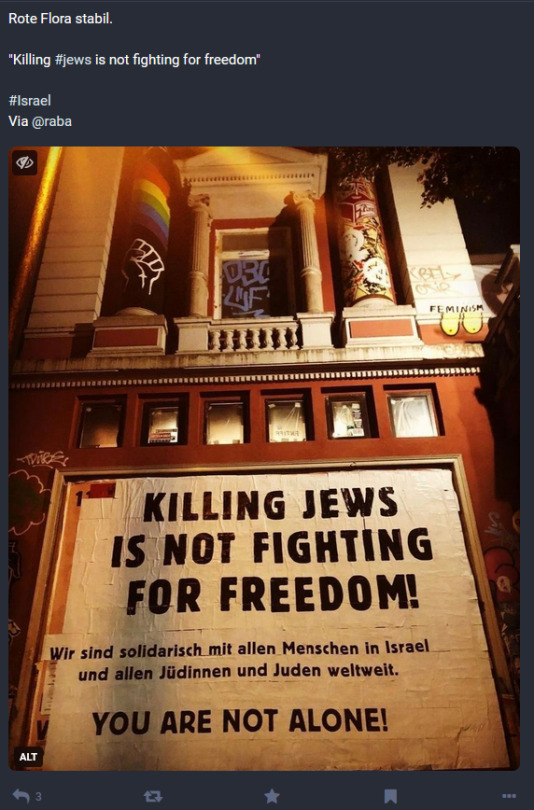
Rote Flora is an autonomous center in Hamburg since 1989. They fly a banner reading "Killing Jews is not fighting for freedom! We are in solidarity with all humans in Israel and all jews in the world. You are not alone." Someone posted this picture with the caption: Rote Flora stabil. which is kinda like saying it's based.
Examples end.
This is what I get from left and left leaning groups. Our public broadcast is of course zionist af, but to the point where American news like CNN are nuanced in comparasion.
The conflation of antisemitism and antizionism is just off the charts. I already lost one account for pointing out that these are different things, so I have to mute everything lest I blow up at any of these.
How can anyone look at the situation of the palestinian people and come away with anything but antizionism? That's why we have the term. Who but left and left leaning folks can look at this though a materialist lens? Isn't that our thing?
#israel#palestine#gaza#leftism#germany#mastodon#antisemitism#antizionism#free palestine#rant#taz#amadeu antonio stiftung#rote flora#berlin#hamburg#cologne#bonn#köln#news from the twilight zone
61 notes
·
View notes
Text
It always weirds me out when people use the actions of a singular group (or even multiple groups) to kind of imply something about all of their contemporaries. Like the people who say queer stopped being a slur because Queer Nation existed/"We're here, we're queer" was a motto ignore the fact that... LGBT activism back then (AND now) was... a highly debated, tumultuous thing with many different groups who agreed with each other on some things (SOMETIMES) and disagreed on others. Or many groups who never, ever agreed on anything besides sharing an identity.
There was always "infighting," some of it ideological (like disagreeing on tactics, slur usage, whatever) and a lot of it just... prejudice and oppression (like excluding trans women of color).
And it's kinda clear this leveraging of one group of people's activism to claim "Queer was never a slur/wasn't a slur back then/isn't a slur now" is just intentional obfuscation because no one does the same thing for Dyke and Fag, despite those words ALSO heavily being used in slogans, signage, organization back then.
The existence of Dykes on Bikes isn't used to tell lesbians that they should all enjoy being called Dykes and actually calling all of you the dyke community.
instead, it's acknowledged that like... no, some people can reclaim it, some can see it as a neutral/positive term, and some groups may even use the term dyke but like... you don't call a random person a dyke and expect it to be received well. You don't accuse someone of LYING if they say they don't like that word and it's a slur.
So it's just like... very blatant historical revisionism to claim that SOME LGBT people using queer to make cishets uncomfortable, utilizing it BECAUSE it was a slur, means it wasn't offensive back then and isn't hurtful now. Or that between it's political usage back then and current day, people "decided" to make it a slur and "elders' are fine with it.
Like if I go bring you a sign from 1987 or whatever that's like "I"m a fag and I love my Dykes" (and variations of that DO exist) and you gonna change the acronym from LGBT to be FDT (Fag Dyke Trans) or are we gonna be like... normal and recognize the nuance here.
30 notes
·
View notes
Text
In Defense of Yosuke’s Parents
I’ve seen so many posts about Yosuke having bad parents which really surprised me because I didn’t get that impression at all. I’ve been meaning to make a post in defense of his parents, but I’ve been working on a Yu analysis. After I saw @personuhh’s post I thought I’d offer an alternative perspective. I’ll be addressing some of the things they brought up first, and then I’ll get into additional evidence. I have edited this post since I originally posted it because I I wanted to elaborate and reword some things.
My Response
You’re right, Yosuke does take on way more responsibility than a part-timer should. However, I don’t think that’s his parents doing. It seems like Junes is extremely understaffed. In his social link, Yosuke says his dad was “bugging him to find helpers.” I volunteer at a small location of a large church (much like the Inaba branch of Junes), and I have been asked to find more volunteers over and over again because they’re desperate for more help. It’s a lot of work and not enough people. Additionally, both Yu and Chie come in to help due to the lack of staff. I wouldn’t be surprised if Mrs. Hanamura helped out too as Teddie’s under the impression that Yosuke’s parents are always together (which I’ll talk about later).
On top of that, Yosuke mentions part-timers ditching work and slacking off. When an employee doesn’t show up, Yosuke (and Teddie) are often called in because their managers know they’ll show up. People who are reliable are given more responsibility, period. It sucks, but if someone needs help they aren’t going to ask someone who they don’t see as dependable. I volunteer at church every week, and I have been asked countless times if that’s okay because they don’t want to overwork me. Every time I say I don’t mind, and I assume Yosuke would have the same reaction if asked. Not only is it Yosuke’s natural instinct to help people, but he was kind of a pushover before the events of (and at the start of) Persona 4. In his third awakening, Yosuke says he was overworked and taken for granted. That’s not okay, and it’s a huge problem, but Mr. Hanamura isn't the cause of that. Mr. Hanamura is the general manager; his job isn’t to create the part-timer’s schedules.
It’s true that Yosuke tries to work out the problems of other employees and listens to their complaints. There is no indication that Yosuke was told to do this, and I don’t know why he would be. In his social link, there are two girls who act as if he has more power than he does. They demand a raise, ask him to give them the day off, and assume he has knowledge about another employee’s schedule. Yosuke says he doesn't have the power to help them, and in a manga page he says “I may be the manager’s son, but I’m still just an employee.” Yosuke is doing much more than the average part-timer, but he isn’t being given the responsibilities of a manager.
As for the Junes concert, Mr. Hanamura did not tell Yosuke he was going to be fired. Yosuke came to that conclusion himself. Mr. Hanumura did not ask Yosuke to find a solution or ask Rise for help. Yosuke only asked Rise for help because he was scared of moving again. I understand how the phrase “awfully nice for some reason” could come across as odd, but I don’t think he meant his dad isn’t usually nice. In the Persona 4 Manga that scene is translated as “My Dad’s been extra nice to me” meaning his dad is nice, he’s just being extra nice, and I’m not surprised. Yosuke was extremely unhappy when he moved to Inaba. Despite trying to hide his feelings, you can see in The Magician that he didn’t do a very good job of it. And now that Yosuke is finally happy, they might be forced to move again. Of course, Mr. Hanamura would feel guilty. Oftentimes, when people feel guilty, they start acting nicer - unnaturally so - to make themselves feel better. Chie (who is already very kind) even does it after she and Yukiko spend Yosuke’s money on clothes for Teddie. Yosuke notices the shift in her attitude and tells her that he’s worried. It’s the same reaction he had toward his dad’s behavior.

The only reason I bring up Chie is to show an in-game example of someone being overly nice due to guilt. What Chie did was wrong, that’s why she feels guilty. The reason Mr. Hanamura would feel guilty is his job may have to move his entire family again. The cause of their guilt is different, but they are responding the same way.
I don’t think Mrs. Hanamura not wanting her son to own porn is unreasonable. My mom doesn’t like magic, so I wasn’t allowed to read or watch Harry Potter growing up. Similarly, a friend of mine wasn’t allowed to watch iCarly. As for Mrs. Hanamura burning Yosuke’s porn in Arena, that’s the third time (that we know of) that she’s seen his porn. I assume she’s told him she doesn’t want him looking at pornography, but he continues to do so anyway. Burning his magazines may seem dramatic, but she was likely just frustrated that he kept disobeying her.
I don’t think Yosuke’s parents are the reason why Yosuke wants to be seen as manly. I haven’t seen anything that implies that. I think Yosuke’s desperation to be seen as a man comes from Japanese society and his fears regarding his sexuality.
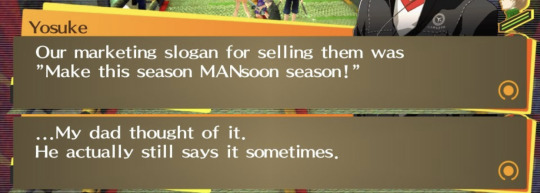
Mr. Hanamura came up with this slogan because they were selling jinbei's which are traditionally worn by men. It’s a play on words. This isn’t the first time Mr. Hanamura has come up with a cringey slogan.
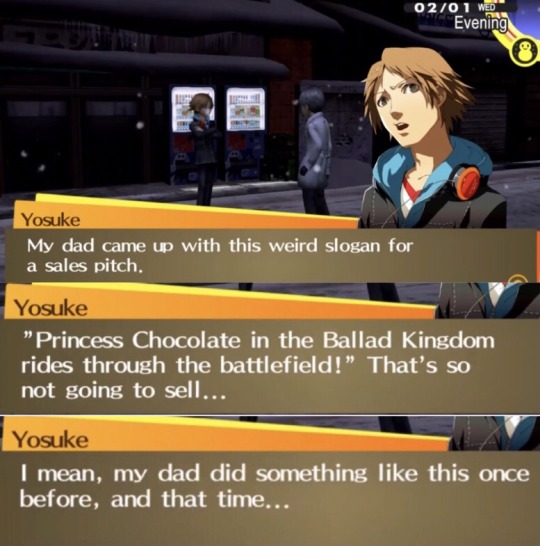
It seems Mr. Hanamura has that stereotypically “dad humor” which is typically associated with positive father figures (it’s not always). Yosuke saying his dad is still saying the “MANsoon” slogan gave me reminds of kids being like “Dad, that’s a bad joke, stop”, but the dad continuing to make his bad jokes regardless. It’s very Disney Channel and sit-com like.
I don’t remember Teddie saying he watches violent war movies with Mr. Hanamura, but I don’t see how that connects to the idea of Mr. Hanamura pushing Yosuke to be a “more masculine, traditional, unshakable, unemotional man.” The idea that only those types of men watch war movies is the type of thinking Kanji’s and Naoto’s shadows were trying to address. I don’t think Mr. Hanamura cares about being that type of stereotypical/traditional man because of his relationship with Teddie. Teddie is not very masculine (he even says so in Persona Q, screenshot will be later), and he isn’t hiding it.
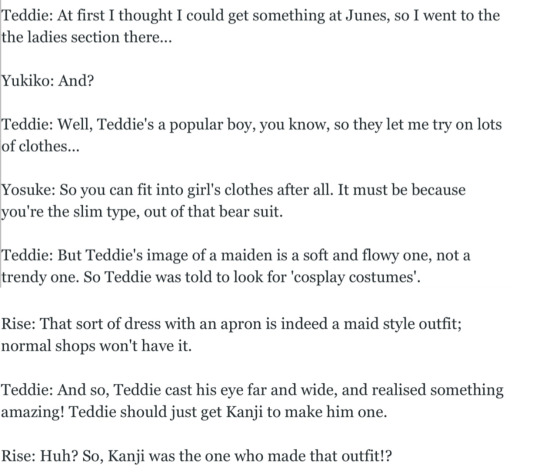
This exchange is from Kanji’s Persona 4 Club Profile. Teddie went to the store to buy female clothing, and he asked Kanji to make him a dress (the one from the cross dressing pageant). He already owned his “Alice dress” before the cross dressing competition, and I assume he’s worn it. In Arena, you can see the dress is hung out in the open in their bedroom. He also wears hair clips.

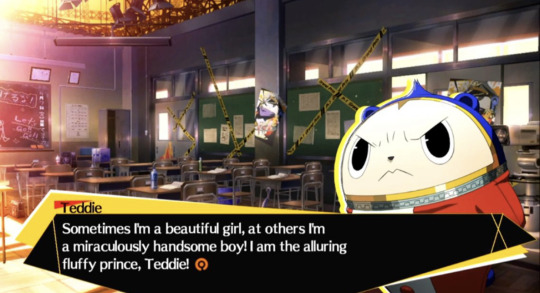
This is not “masculine behavior” yet the Hanamuras don’t seem to have a problem with it. If anything, I’d say they’re pretty open-minded. If they disliked that way Teddie behaved, Teddie would change himself to fit the way they want him to be. I mean, the kid literally grew two new bodies in effort to get people to like him. Due to Teddie’s low self-esteem and need to be loved, he takes any sort of criticism to heart and does his best to act the way others want him too. In Persona Q, Yukari says he’d be cute if he was quiet, so Teddie stops talking.
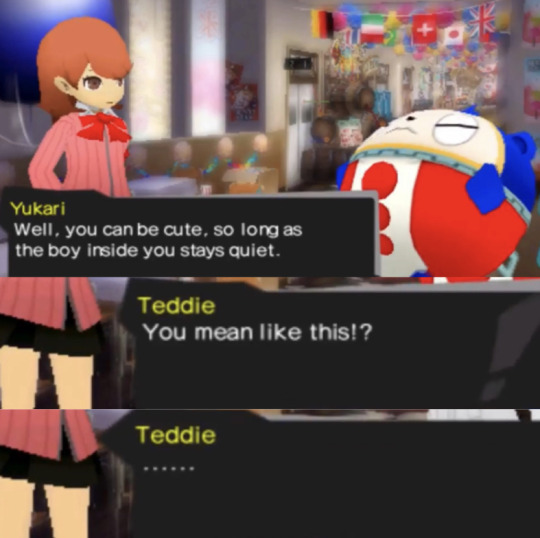
In Persona Q, Teddie says he’s realized that to steal hearts he needs to be manly. He gets this realization from Koromaru. He did not think this prior.

Teddie saying Koromaru gave him this realization means the Hanmuras never said anything to him about his less masculine behavior.
As for the song lyrics you posted, I don’t really think that means anything. Yeah, people often relate to the music they listen to, but they don’t have to relate to every lyric or even song. My favorite artist is Taylor Swift, but I don’t really like romance. I don’t relate to most of her songs, but I still jam out to them. I could be super wrong about the song thing though because I’m not a huge music person.
My Own Additional Analysis (with some elements of response)
In this section I’m going to talk about Mr. and Mrs. Hanamura’s character and personality, their relationship with each other, Teddie, and Yosuke.
Let’s start off by talking about their personality. They seem to be very carefree people. Yosuke has less than average grades. In the Persona 4 Animation, he didn’t even show up to one of the exam days. Academics is extremely important in Japanese society, yet his parents don’t seem to be pushing him to get better grades. Considering how carefree Yosuke can be, it makes sense that he may have gotten that trait from his parents.
Yosuke’s family is pretty wealthy. It’s mentioned more than once. They also live in a pretty big house (you can see it in The Magician), Yosuke’s cell phone seems to be a newer model, and he has a large, flatscreen TV in his bedroom which wouldn’t be very common when the game took place. Despite this, Yosuke works for his own money. He complains about being broke and needing save up. I think the reason why Yosuke has a job despite being well-off is because his parents want him to have work experience and grow up to be a hardworking person, so he can succeed in life. It makes me think that hardwork is important to them.
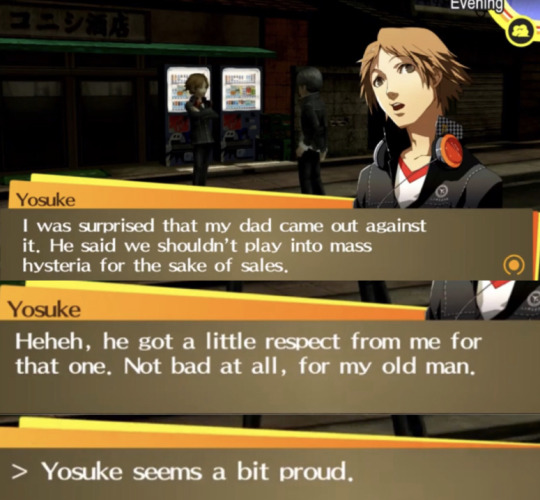
Due to this conversation, I think Mr. Hanamura is a very honest man. Yosuke says he was surprised his dad was against selling gas masks, likely because from a business standpoint, that’s a really big missed opportunity. I think it’s also worth noting that ATLUS talks a lot about how people naturally fit into the masses, including the main characters. That’s why it’s surprising that his father is going against the masses. Although he’s losing money and has faced many hardships running Junes, Mr. Hanamura refused to do something that was against his moral compass.
In Persona 4 Drama CD #1, Junes is closing down half of the electronics section due to a lack of sales. Despite this taking place in March, Teddie panics and hopes to sell a TV set in a month in exchange for keeping the TV they enter the TV World through where it is.

Yosuke isn’t afraid to ask his dad two huge favors with a not very good reason (side note: Yosuke had to lie because the truth is that’s the TV he and his friends used to go into the TV world and fight shadows). Despite Yosuke’s best efforts, his father says no. He doesn’t really have any choice but to close part of the electronics floor. Junes is losing money by keeping it open. I think Mr. Hanamura gave him the vouchers because that’s the only other way he can help. Teddie made a deal that if he sells one TV set by the end of the month, they’ll keep the TV that leads to the TV world. He’s trying to advertise the TV set by promising other surprise items coming with it. These Junes vouchers are part of those surprise items.
It’s no secret that many of the shopping district families despise Junes and the Hanamuras. Many horrible things have been said about their family, yet Junes still teams up with the shopping district in the YasoInaba Case File to help keep them afloat. Whether or not this was Mr. Hanamura’s idea, he’s the one who has to approve it, and he does. Despite being treated horribly by them, he still wants to help the shopping district. Junes teaming up with shopping district might be a good business move, but they didn’t really need to do that. The problem is that Junes is taking away the shopping district’s business. Junes doesn’t need to team up with the shopping district to do well. The two of the teaming up benefits the shopping district way more than Junes. It doesn’t do much for Junes other than the shopping district maybe not hating them. At the end of the day, the shopping district families would still shop at the shopping district to keep their businesses afloat, so Junes isn’t getting a lot more business.
When Teddie came to the real world, Yosuke offered to take Teddie home with no hesitation. He didn’t think it would be a problem with his parents or show any concern about how he would convince them. I think this goes along with them being pretty carefree as well as showing that they’re kind and generous people. Not everyone is willing to take others in like that. Yosuke’s also comfortable with asking his parents such a huge favor.
Teddie talks about Yosuke’s parents in a really positive light, and I would say they treat him like their own son. For example, on January second Teddie says, “I got New Year’s gifts! Yosuke’s mom and dad gave them to me!” (edit: Someone said “notice how Yosuke doesn’t say the same thing.” He doesn’t need to. It’s Japense culture to give younger family members gifts for new Year’s. Yosuke saying something would be the equivalent of, “omg my parents gave me a birthday present!!” It would have been weirder if he did say something then. Teddie is excited because because this is his first New Year’s. He’s never experienced this before. Also, Yosuke did get New Year’s money. He talks about saving it on 1/10 when walking to school).
I think I remember Teddie saying he watches movies with Mrs. Hanamura, but I have no idea where he says that. There’s a 50/50 chance I made that up and convinced myself it was canon, so don’t take my word on that one.
Teddie breaks A LOT of rules at Junes. He steals topsicles, rode a handi mover through the store, slept on both a display bed and the floor of electronics department, been yelled at for eating samples, been chased by store security, and Yosuke had to monitor Teddie during his late night shift because they didn’t trust him to work alone. Teddie’s a terrible employee, yet he hasn’t been fired. I think the reason for this is he’s basically the manager’s son. I do want to say that just because they consider Teddie as their own child doesn’t mean they treat Yosuke as anything less. I haven’t seen a single thing that has implied that there is favoritism going on.
Yosuke and Teddie act a lot like brothers (Naoki even suspects that they're related), and Yosuke’s parents seem to treat Teddie like their own son. He even wears their family crest in offical art. I looks like ATLUS wnted the four of them to be a family. And If that’s the case, it wouldn’t make any sense for Mr. and Mrs. Hanamura to be bad parents.
Additionally, if Mr. and Mrs. Hanamura treated Yosuke badly, and Teddie noticed, I think Teddie would say something.

The second Yukari said something slightly mean about Yosuke, Teddie defended him. He doesn’t like when other people say mean things about Yosuke. Not to mention conflict really stresses him out. If Yosuke’s parents treated him badly, I there’s a chance Teddie might see the problem.
I think it’s also worth noting that Yosuke’s parents have a really healthy marriage.

This quote implies that they’re rarely apart and get along really well. A happy marriage doesn’t automatically equal a healthy household or good parents, but it really increases the likelihood.
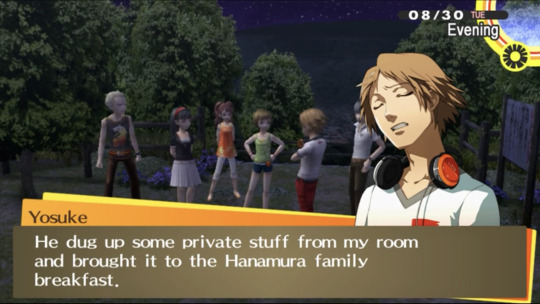
For context, Yosuke is talking about Teddie in this picture. I’m not from Japan, so I don’t know if most families there eat breakfast together, but my family - despite being very close - does not. We all eat and start our day at different times. In my mind, eating breakfast together is a very domestic thing to do. Even the phrase “Hanamura family breakfast” screams domestic to me.
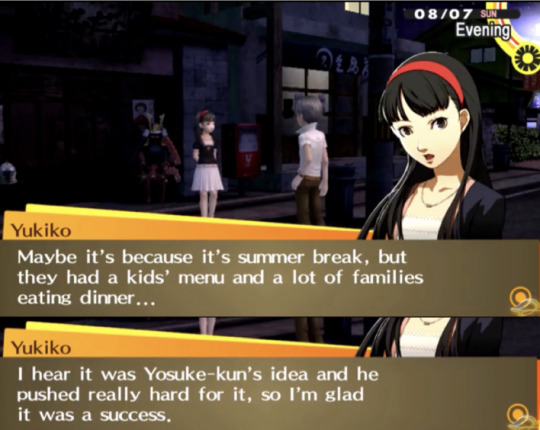
This conversation gives me the sense that Mr. Hanamura has a great deal of trust and respect for Yosuke. I mean, I don’t think he would accept Yosuke’s idea if he didn’t. Adding a kid’s menu would be pretty exspensive. Not only do they have to print the kid’s menu, but they have to design them, create new menu items, and depedning on what’s on the menu buy more food or ingredients. That adds up, and if it isn’t successful then they’ll lose money. Mr. Hanamura has to approve that idea, and he’s putting in trust that it’s going to be successful. Also, Yosuke is comfortable enough to “push really hard” for his idea.
All in all, it is my personal opinion that the Hanamurs are a really close family. It would make sense for ATLUS to go in that direction to create a contrast to the Narukami’s, after all. That being said, neither headcanon is wrong. It just comes down to how we interpret the very little information we’re given.
#yosuke hanamura#teddie persona 4#persona 4 teddie#teddie#not a quote#analysis#persona 4#p4#Hanamura bros
217 notes
·
View notes
Text
What You Need to Understand About Patents and also Their Value

The number of patents released in the United States rose to 187,000 in 2003, up 22 percent from 1999. For innovators that comprehended the system or that were privileged, the benefits have been enough. Licensing fees from trademarked inventions currently earn $150 billion globally every year, a figure that is expected to climb almost 30 percent over the following some years.
At the same time, patent infringement lawsuits have been filling up headlines daily. The number of patent violation suits submitted each year in the United States. grew 64 percent in the duration 1991-2000.
Throughout 12 months finishing in September 2003, U.S. patent proprietors submitted 2,788 patent infringement lawsuits, a 13 percent increase over the same duration five years earlier, as well as more than double the 1,178 patent fits filed in the calendar year 1991.
However, lots of creators have not applied for their patents despite having legitimate insurance claims of violation. In some cases, they have been bewildered as well as intimidated by the expenses included.
Much of the time, these dissatisfactions can have been avoided if inventors had been armed with the expertise and also understanding of what patents are (as well as what they are not) and exactly how to determine their worth. Such understanding can make the difference between success and also a failure for an ambitious inventor.
Potentially the greatest misunderstanding issues what a patent is and also what civil liberties it offers to its owner. Numerous think a patent provides the inventor the right to produce or market the copyrighted invention. Absolutely nothing can be further from reality. Also check out https://kulturehub.com/inventhelp-support-inventors/
A Patent's Value
By statute, a patent is the right to exclude others from making, using, selling, offering for sale, or importing the trademarked invention. To put it simply, a patent is an exclusionary right as well as pays for no favorable legal rights whatsoever. A patent is just a certificate to demand infringement.
A patent is a state-sanctioned monopoly that is limited in 3 means. It is just active for twenty years from the filing day, it is just valid in the nation that gave it, and also it is restricted to what is specified in the patent's insurance claims.
Before applying for a patent, an inventor ought to ask concerns regarding its potential value. Is it much better to protect the technology by patenting it, or by keeping it as a profession secret?
To answer any one of these inquiries wisely, you require to evaluate the worth of the patent. The value of a patent ought to not be puzzled with the worth of the patented product. The two stand out and real-time separate lives.
To put it simply, a product without a patent has worth; so does a patent without a product.
Coca-Cola, for example, is a product without a patent. The product lives on, nonetheless, without the patent security, it when had.
An example of a patent without a product-- a supposed "paper" patent-- is a patent on an intermittent windshield wiper. The inventor, Dr. Kearns, never sold the product himself. He got $10.2 million from Ford, after taking legal action against the automaker, and also successfully imposed his patent versus a lot of other cars and truck manufacturers.
A lot more current instance is a patent on "Java" technology which came to be Kodaks as a result of a merger. Kodak, which had never marketed the modern technology, recently accepted a $92 million settlement of its violation of legal action against Sunlight Microsystems.
The worth of a patent is the difference between the worth of the product with a patent and also without it.
If the patent is certified, after that its value is the web present worth of future nobilities obtained from licensing, plus incremental profits earned from the market monopoly secured by the patent. You can also check https://midhudsonnews.com/2020/05/10/how-does-inventhelp-support-new-inventors/
Certainly, if the patent is not implemented, it is not worth very much at all.
How to Use a Patent
A patent can be utilized in two major ways. If you are making or marketing a patented product, the key use of the patent is to shield market share by keeping rivals at bay. If you are a scientist, you only intend to generate any kind of earnings may be by accrediting the patent.
There are 2 types of licenses: a carrot license and also a stick certificate. The carrot certificate is a volunteer license in which the prospective licensee, often a maker or marketing expert is not utilizing the patented modern technology and also is under no obsession to accredit the patent from you.
Patents safeguarding sophisticated innovations developed in the academic community normally lend themselves to carrot licensing. Stick licensing occurs when the potential licensee is currently generating as well as marketing your invention, consequently devoting patent violation.
The slogan of stick licensing is "License my patent otherwise ..." (Read: I will see you in court!). Most infringers will make the negative, however not unproven, a computation that they will possibly not be taken legal action against-- usually, they are right, as a lot of patent owners fall short to apply for their patents. Hence, stick licensing will work just if the hazard of litigation is legitimate.
No hazard shows up to exist when it comes to carrot licensing. Or does it?
Allow's say you offer your most recent invention to a possible licensee and also persuade them of the overwhelming advantages of your innovation. What quits the other party from thanking you for enlightening them on the advantages of your invention and afterward proceeding and also marketing it without a permit from you?
A confidentiality arrangement, which most manufacturers reject to sign in the top place, even if carried out, will barely stop a business from using your technology. That's because the confidentiality agreement can not protect openly readily available details.
A patent is a public record, in which the invention is completely divulged, allowing anybody with sufficient manufacturing and advertising and marketing capabilities to produce and also disperse it. The only thing that stops a possible licensee from benefiting from your invention is the threat of a patent infringement legal action.
Thus, every carrot license is a stick license in disguise. Such words as infringement or litigation are never discussed in carrot license negotiations, they are in the back of everybody's mind. As well as, once more, unless the overlooked hazard of possible future lawsuits is qualified, why would anyone take a license?
You can trust the prospective licensee to ask their patent attorneys just how simple it would certainly be to prevent or "layout around" your patent. Only a well-written patent combined with the capacity and also the resolve to implement it may urge a prospective licensee to think about certifying it. Find out more advice https://www.techtimes.com/articles/249715/20200518/how-inventhelp-gets-new-inventors-onto-the-right-path.htm
Determining Just How to Apply for Your Patent
Every inventor submitting a patent application needs to stop briefly as well as ask a concern: Do we have the wherewithal to apply for the patent if it is infringed?
Several companies, particularly academic and research institutions, are litigation-averse. This undermines the value of their patent portfolios. If the message navigates that a particular organization hesitates to impose its licenses, why would certainly anybody license that company's licenses when the copyrighted invention could be infringed without major danger of legal effect?
Nevertheless, it is inadequate to have a proper perspective toward patent enforcement. This mindset requires to be supported by a healthy savings account. With the typical expense of patent violation litigation in the UNITED STATE exceeding $2 million, patent litigation is the sporting activity of the abundant. Unless you are used by a well-financed company that stands prepared to bankroll the litigation, you may not be in a setting to carry out your threat-- whether explicit or implied.
For tiny businesses and also specific developers, there are alternate approaches to financing patent violation litigation. One is to locate a law office that will represent you on a backup basis.
This means that as opposed to invoicing you by the hour, the law practice will certainly obtain a share in the monetary recuperation, which may be an award of damages to the winner of a suit or licensing charges worked out in a negotiation. A typical backup cost might be between one 3rd and one half of the recuperation.
#Patent#Ideas#Inventors#Prototypes#Inventions#Technology#Innovation#Should I use InventHelp#What is InventHelp#help with inventions#InventHelp
132 notes
·
View notes
Text
HYBE Theory
Disclaimer: These are just my thoughts on HYBE the past few days and is definitely not confirmed. Please don’t take any of this to be true.
INTRODUCTION
On January 1, 2021, Big Hit Entertainment (hereinafter referred to as Big Hit) introduced a new boy group that will be debuting under their Japan subsidiary. The news has sparked some questions among PLUShies about whether the name “HYBE” will be for the new boygroup or not. According to recent trademarks from Big Hit Japan, it was discovered that the name of the boygroup will actually be &TEAM.
So in the midst of celebration among PLUShies, there were a few questions still being thrown around but the one main question was...
Is HYBE the name of the new girl group?
Theories and different takes on HYBE’s purpose made its way around Twitter and some of the popular ones include:
The name of the group to debut under Big Hit and Source Music
A social platform
Streaming service for music
But after running the service mark applications through a couple programs and watching both corporate briefings in 2020 several times, there’s another possible theory that we could consider.
BACKGROUND
I. HYBE Activity in Chronological Order
December 18, 2019
A little more than a month after the last PLUS Global audition in Ho Chi Minh City, Big Hit applied to trademark the name HYBE. [source]
October 7, 2020
Nearly a year later, Big Hit trademarked several other HYBE-related items including 2 different logos and 2 face-marks. [logo 1 source] [logo 2 source] [face-mark 1 source] [face-mark 2 source]
II. TRADEMARK CLASSIFICATIONS
If you look through each of the 5 trademarks, you’ll see that they’re listed under various Classes including 35, 38, 41, 42, 43, and 45. These are the identifications for those classes:

These classes are very similar to many projects and campaigns that I’ve helped with that provided “portable entertainment”. I remember one of the organizations dealt with a sort of an app and amusement park combo where the app can act as a map and an interactive game at the same time.
III. CORPORATE BRIEFING
During February 2020′s corporate briefing, CEO Lenzo Yoon introduced a new plan they were planning to roll out sometime in 2020. Around the 30:19 mark of the video, he starts talking about what Big Hit’s plans were to help innovate the fans experience.
Their first plan is to boost up customer service experiences at the various tour stops that BTS does. “We will turn cities hosting these concerts into a festival.” Big Hit plans to turn the places around the concert area into “tour villages” so that fans can enjoy both the show and play tourist by doing site seeing, pop shops, cuisines, etc.
Here’s the video to the corporate briefing:
youtube
MY REACHING THEORY
In all of trademarks above, you can see that the classes they have under them can possibly imply that HYBE might possibly be this tour village. When looking at the classes of each trademark, you’ll find that the two trademarks from October 2020 without the slogan WE BELIEVE IN MUSIC are listed in all 6 classifications.
The other two with the slogan is only listed 38, 41, 42, and 45. The two classes not included were 35 and 43, which includes the retail, dining, and accommodation services part of the brand. So there might be two parts of HYBE, one that deals with the show aspects while possibly broadcasting it and the other deals with the tour villages and the more social part.
The reason they didn’t roll it out is probably because the pandemic put a halt to some plans. It’s been known that Big Hit has been taking a business approach in a lot of the things the past year and a half, so it made sense to try to take the business-like theory approach instead of a Big Hit universe one.
PERSONAL TAKE
I personally would love the group name or label to be HYBE because I’ve gotten used to the word being used in most of our theories. Given that it would be a risk for Source Music and Big Hit to debut PLUS Global’s new girl group nearly the same time as Belift’s I-LAND girls, they have no choice but to debut PGNGG during Q1.
If Big Hit wants to take a business approach by introducing all these new groups under various sub-labels at once, they would need to do it properly by keeping both girl groups at least 9+ months from each others debut dates. There were several theories going around about parts of what I just covered and I definitely see why some thought it could be the label name. The classes they fall under seem to point that way so it’ll be exciting to see if it’ll actually be the sub-label name or a streaming app! Either way, we’ll be getting news soon about the girls, whether or not the HYBE name is involved.
#PLUSGirlsAreComing #PLUSGirlsROTY #watingforTHEGIRL
ADDITIONAL SOURCES
[1] [2] [3] [4]
#plus girls#plus global#plus auditions#big hit entertainment#source music#hybe#pgngg#plushies#theory#big hit theories#PLUSGirlsAreComing
7 notes
·
View notes
Text
I’m real tired of people on WA not understanding the meaning behind ACAB/1312, BLM, or ALM. so, let’s get educated shall we? I may post this on WA, but I’m not sure if it would stay up or not. mod? I understand if you decide not to post this <3
ACAB (all cops are bastards) does not imply that all cops are individually bad people. ACAB is a saying that represents intolerance towards the corrupt system that they(police) are willingly and silently working beneath, despite their claimed intent of keeping the peace and protecting the public.
black people are apart of the public, and their protection as well as respect for their basic human rights are not seen nearly enough from the American police force, hence the rioting and protesting. the term ACAB, or 1312, is not being used to attack individual policemen and women. it is a term that is being used to call out the lack of reform that police are depriving their system of without good reasoning. because if they were really all for protecting the public, then they too would stand against the systematic racism instead of ignoring it.
systematic racism cannot come from on individual, it has to come from a group of authoritative individuals and a group of followers who are decisively ignorant about the racism that is being enforced into their training and their orders. saying all cops are bastards is speaking out against the injustice of the law enforcement system, not the police themselves.
and while, yes, there are good cops, deeming them “good” isn’t exactly appropriate considering they’re silent through the crimes their fellow officers commit against the black community. they do nothing to change, stop, or speak out against the lack of punishment towards these racist assaults and murders. whether or not punishment is a factor, the police who are not committing racist injustices should still be speaking out. ESPECIALLY if punishment is a factor, because nothing will change unless something is said to get things done. they’re just as guilty as the cops committing the crimes for letting it slide without so much as a glance.
about 10% of cops are the "bad apples" but 80% are relatively good, however when they see corruption, they don't report it or say anything. the other 10% are the good cops, but because of police unions their good deeds are generally disregarded. nonetheless, these good cops are STILL in the wrong for their deliberate negligence of the crimes taking place beneath their very own system.
it has also been proven that around 40% of cops are domestic abusers, even despite the lack of reports for some of these instances, you can assume that this statistic is probably higher due to the number of domestic violence cases that go unreported by family members of abusive police.
so, again, ACAB & 1312 is not a slogan designed to hate on police in general. it’s designed to bring light to their unacceptably corrupt system and their faults (specifically regarding the lack of attention brought to the system) as good officers working beneath that system. we use ACAB because we want the system reformed. because we want to end the blatant racism being displayed by the very people meant to be protecting and siding with the community. that means ALL parts of the community. meaning black people too.
BLM (black lives matter) is not a phrase that depicts black lives are any more important than any other life. it’s a phrase that’s saying they matter JUST AS MUCH, because as of now, the law enforcement system doesn’t acknowledge that black people are important, meaningful, functional, NORMAL people in the community that are deserving of the same basic respect and rights that anyone else is. right now, they are being deprived of this from the justice system, and BLM is meant to bring light to this issue. no one is saying that black lives are more important than white/Mexican/Asian/Indian/Native American/ANY other race. but black lives are the ones that need saving right now. BLM is bring attention to the fact that black lives are being (and have been for centuries) severely fucked over and the world is tired of it. there’s no reason for racism to still exist, and there is absolutely no room for it in law enforcement because these people are meant to be trusted with our LIVES. how can we do that if an entire portion of our population is being assaulted and murdered in the streets for no good reason other than “they were black and looked suspicious.” fucking unacceptable.
so, in an effort to bestow that justice to the black community, rioting and protesting has broken out, alongside the phrases BLM and ACAB/1312. and with them, ALM has also sprouted up. but here’s the thing. ALM (all lives matter) is true, yes. but it’s literally defeating the purpose of our protests and our riots. it is invalidating the entire movement because it draws attention away from BLM. YES, all lives DO matter, but right now not all lives are being oppressed and suffering inequality from all corners of the country, hell, the WORLD even for merely their skin color. ALM is terrible. it’s disgusting. and if you plan on using it, educate yourself before deciding that it’s a good way to spend your energy and to slander your own name. ALM does not achieve anything for the black community and by spreading and promoting ALM, the black community will continue to live under racist injustice from law enforcement. no one wants that. black people especially don’t want that. step into their shoes and think about it for a minute. that head upon your shoulders shouldn’t go to waste, so fucking use it for once. ignorance is not something that can be tolerated during these times of crisis, and if you’re choosing to be ignorant and silent, you are ultimately supporting the systematic racism. the blatant, inexcusable murder and mistreatment of black people for simply jogging down the street. for reading a book. for making a phone a call. if you are not with us in the movement, you are against us. there is no in between on this one, and everyone needs to take the time to educate themselves and each other. ALM is destroying the building blocks of the BLM movement. don’t use it. ACAB/1312 is calling out the justice system for their fuck ups. BLM is showing how fucking tired we are of the oppression based upon race. most of these things are not being interpreted correctly from several different viewpoints, and I hope this cleared some things up
#submission#posting this bc fhe information is very educational#do not send in asks debating acab i will block your bootlicker ass#abuse ment
47 notes
·
View notes
Text
[Old Manics meta repost, originally written in 2015 or 2016. I was definitely in a....place....when I wrote this.]
Cue yet another long convoluted rambling strange post about Richey Edwards and Theodor Adorno. For some reason this has been rolling around in my head as half-formed thoughts for a while. They’re definitely still half-formed, but I wanted to get them out of my head and into something slightly more sentence-like.
[Uhh, TW for weird logic, ED-style thinking, and convoluted ill-formed ideas.]
In one of Richey’s manifestos to a zine in December 1992, he writes “THE GODS THOUGHT THERE IS NO MORE DREADFUL PUNISHMENT THAN FUTILE AND HOPELESS LABOUR. GROW UP, GET FUCKED, WITHER. NO ONE IN THIS COUNTRY KNOW HUNGER, TRUE HUNGER LIKE SOMALIA. EVERYONE HAS CLOTHES, FOOD, A DRINK. EVERYONE IS LAST, PATHETIC WRETCHED. THE ONLY FREEDOM LEFT IS THE FREEDOM TO STARVE. FILL YOUR HOME WITH ANYTHING YOU LIKE BUT YOU CAN’T INVENT ANOTHER COLOUR…” The “freedom to starve” quote keeps being attributed to him on the internet, or to Tom Morello, lead singer of Rage Against The Machine, who has a different but similar quote about capitalism and labor exploitation that includes the phrase. (It also appears in the comic V For Vendetta, apparently.) But the phrase didn’t originate with them. I keep seeing repeated uses of it when reading essays by Theodor Adorno from the 60s, and I’m sure the phrase is probably older than that. Morello’s quote containing the phrase is essentially summarizing one of Adorno’s ideas.
So far I’ve come across the phrase in two of Theodor Adorno’s essays. One is in “Freedom In Unfreedom”. In essence, it discusses the paradox of the idea of freedom in our current society. He essentially says that people no longer have a specific concept in mind when they invoke the word “freedom,” and that the nature of present society means that whatever concept of freedom we come up with is not possible because it contradicts current circumstances. He gives the example of early Nazi Germany, when an social-democratic organization took up “Freedom” as its slogan, but the concept and the term had lost its power entirely because employment was incredibly low, and people were struggling, so upholding freedom as a conceptual principle which implies self-determination looked foolish because in practice no one is free and everyone is unemployed and starving and unable to access food/wellbeing and therefore unable to practice self-determination. He says “In other words, freedom was exposed as the freedom to starve; people had direct experience of their dependence on society, a dependence that made a mockery of a freedom that was defined in purely formal terms.”
The other Adorno essay that uses the phrase is “The Culture Industry: Enlightenment as Mass Deception”. Basically, in the section that uses the phrase he discusses the way that the culture industry (or mass culture) exploits and uses artists by homogenizing them. He says “anyone who resists can only survive by fitting in.” Freedom is supposedly given to each individual (in society, in art, in expression, in culture, in the workplace) but if a person doesn’t inherit the ability or resources to succeed in life, then this freedom becomes the “freedom of the stupid to starve”. People who aren’t able to adapt to society’s expectations/who question or refuse to conform are neglected and made to starve, literally or metaphorically. The blame is placed on them for their inability/unwillingness to adapt or conform, because they were “given” the opportunity to succeed (despite that opportunity requiring conformity, or changing their nature, or giving up morals, etc). So a person who is unable or refuses to conform to society and culture and the working class, who goes hungry or cold (literally or metaphorically), is an labelled outsider. They retain their integrity, or their morals, or their original artistic vision, but they suffer through loss of wealth, or faith, or by being rejected and called an outsider and being mocked or no longer listened to. They are free, but at a price.
Applying this to Richey, I thought it was interesting that he seemed to be taking freedom to starve both literally and figuratively. “Freedom to starve” becomes a refusal to consume in certain ways, ascetism, essentially. It becomes a literal or physical manifestation of the neglect that occurs when a person refuses to conform to society’s expectations. It becomes Richey refusing to conform to society’s expectations of food consumption while also refusing to conform to musical and artistic standards by creating The Holy Bible and specifically pointing out the wrongs of society. The band having complete control over the album, hiding in their studio and working together without any outside influence pushes against the expectation of producers/managers/sound engineers/labels/etc having partial influence or control over the sound of a band’s music. Richey’s inability to adapt mentally to fame, to touring, to the stress of schedule, etc etc also is a sort of manifestation of that “freedom of the stupid to starve”, in that he was unable to properly adapt to what was expected of him in terms of fame and touring, and he was blamed for it and seen as strange for disliking aspects of fame.
This is where I get into some interesting, if problematic, ideas. Richey seemed to kind of take the idea to another level through his eating disorder. Freedom to starve/freedom of restriction essentially becomes true freedom because it takes back control of body mind and spirit. Richey sort of talked about this in an interview with Simon Price in 94 in France. He mentioned that people can’t hold you down and force you to eat/watch you all the time, and that your body is your own and you should have a right to do with it what you want. Essentially, self mutilation/self harm/restriction becomes a mode of self-control, a reclamation of the body from expectations of society. Society expects excess and encourages/wants consumption. In creating consumption, the culture industry takes control of the mind and the body by telling consumers what they want even if they didn’t originally desire it, saying it over and over and continually producing under consumers are convinced that they do want whatever they are being given. Self-mutilation, restriction and ascetism removes that and reclaims the body as owned by itself and its mind. It puts control back into the awareness of the self and the body and the mind, which forces the self to be aware of the influence of culture industry. This awareness allows the self to refuse that influence, the refusal of which includes those actions or decisions that go against the expectations or desires or encouragements of society. It also confronts the fact that society sees certain types of expressions of emotion/mental state as “wrong” or maladaptive and those who express themselves a certain way are marked as outsiders. Repression and restriction and stoicism becomes revenge for society marking you as outsider for expressing rage at unfreedom/expressing emotions that are seen as maladaptive. Self-harm or starvation becomes a reclamation of the mind and the emotions, and increasing of that maladaptive expression in order to basically reject society’s expectations altogether. Richey essentially says that when talking about his time in hospital; self-harm or self-restriction takes back control of body and mind from expectations of doctors and society – they can’t hold you down and force food down your throat, someone can’t be with you 24 hours a day, it’s my body I do what I want with it.
The height of this could be disappearance/death: refusal to participate “correctly” in society, refusal to “be” in society in the expected way. A rejection of literally all things. James Bradfield notes that a major theme in Journal For Plague Lovers is a rejection of experience, a rejection of expected lyrical formats, and a rejection of some sort of answer or truth. A realization that nothing seems to be working. A refusal to continue to consume or participate correctly or to express consumption or participation correctly, especially in that the meanings or messages of most of the songs are completely obscured through unconnected phrases or disparate references that take research to decipher. The idea is sort of expressed in individual songs from the album as well. All Is Vanity asks questions of vanity extremes vs personal neglect – which one is refusal to participate correctly? Are they both refusal? Are they the same? Inability to adapt correctly compared to what is expected/right vs what you are doing and how your actions are called into question as incorrect. Discipline is respected, but certain types of discipline are seen as different/maladapted compared to the expectations of society or the culture industry, which allows for the question of which type of discipline is “wrong” or “right” and does it depend on perspective? Excesses are lauded in the culture industry, consumption is encouraged, as is vanity and obsession with the self, and ascetism or restriction and neglect of the self is seen as wrong. But extreme excess of consumption is also frowned upon or mocked. Society encourages a certain amount of excess and consumption in order to control and delude. In encourages and creates consumption so that the consumer doesn’t stop and thinking about how they are being made to overwork and overconsume in ways they probably didn’t originally want to be doing but have been convinced into by society. Refusal of consumption/vocal awareness of participation in consumption becomes maladaptive because it’s not what society wants, which is exactly the kinds of words and things the band was expressing.
And the idea of disappearance or death takes all of this to the highest level, in that disappearance rejects society’s expectations entirely, refusing to participate in society in a “correct” way. It is also expressing whatever sort of emotions or thoughts a person might have in a way that creates an absence (metaphorical and literally) rather than yet another thing to be consumed. Disappearance when a person is still living is a complete reclamation of the body and self because the person essentially is able to drop out of society as themselves, and even if they assume a different identity, they are still inherently refusing to participate in an expected way, still creating an absence of a person and an absence of an identity, and in using a false identity that refusal becomes even more complex. Death, too, and specifically suicide, is a refusal to participate in society, but in a much more final way. Suicide is yet another reclamation of the body, since it is by one’s own hand and willpower that one’s life is taken, not through illness or another person or old age. It creates a different kind of absence, since often a suicide, since there is a body and often a note, gives answers or at least there is a physical proof of refusal and a physical proof of that person’s death. A suicide creates a narrative with finality, with refusal as the finality and therefore certain aspects of absence are filled in with the assumptions that come with suicide and death in general. A disappearance has a narrative with an ellipses rather than a full stop, and because it is left open, the absence and refusal are left with unanswered questions, reasons, and unspoken ideas, specifically because it is a kind of refusal to participate that is completely unexpected and cannot be explained with a body or a note.
I don’t really have a conclusion to these thoughts or any sort of cumulative idea or whatever. I just was thinking about the phrase “the only freedom left is the freedom to starve” and what it meant in relation to Richey when Adorno is applied.
6 notes
·
View notes
Text
Just One Little Thing Stops Me Every Time (2/3)
Summary: T.J. and Cyrus (separately) get some unexpected advice from visiting strangers. (Hint: The title)
As the other students made their way out of the studio, Cyrus chose to stay on the floor as exhaustion took over every muscle in his body.
He didn’t know why he decided to come to the dance studio for a class in order to clear his mind.
What possessed him?!?! Did he forget that he was terrible at dancing?!?! That he had two left feet?!?!
That day, the studio had a special guest teacher fly in from New York to teach a class – he was a choreographer for several Broadway productions. And, suffice to say, the man was brutal! His routines were complicated and he took no pity on anyone, not even on a beginner and non-dancer like Cyrus.
For what it was worth, though, the man was kind of pretty, in a masculine sort of way. Cyrus was confident enough to admit that to himself now whenever he found someone of the male species attractive.
A sudden tightening in his leg muscles interrupted his musings.
Releasing a pained groan, he reached out with a hand to try and massage the cramp.
“Hey, you okay?”
Cyrus looked up to see the guest teacher looking down at him in concern.
“Yes, sir. It’s just a cramp. No biggie.”
The teacher shook his head, his bright yellow hat shaking with the movement (why did the guy wear hats when they were indoors, anyway?). The man dropped his bag on the floor before sitting cross-legged across from Cyrus.
“May I?” The man gestured to his leg.
Cyrus nodded, giving his permission.
The teacher reached out and replaced Cyrus’ hand. Gently and with much care, he massaged the cramp.
“You don’t dance much, do you?” the man asked, matter-of-factly.
Cyrus scoffed. “I don’t dance, in general.”
The teacher laughed. “Oh, really? I know you can, kid. I saw you! I pay attention to all of my students! You just need a little more work. It took me years to get to the level I’m at now.”
Cyrus shrugged. “Well, I wasn’t really trying to get to your level. I just… needed a distraction.”
He had mumbled the last part to himself but it turned out that the man had great hearing.
“Oh? Must be that bad if you decided to go to a dance class if you can’t dance.”
Cyrus blushed.
The teacher chuckled and continued to massage the boy’s leg until the cramp slowly dissipated.
“There you go,” he beamed, patting Cyrus’ knee. “Take it easy, okay? You might feel the aftereffects on your leg later so if it’s too much, just take an ibuprofen.”
“Thanks… uh…”
The man raised an eyebrow. “Wow, I should be offended that you don’t even know my name! I acted and toured in Broadway for 5 years, you know!”
Cyrus grinned, sheepishly. “That sounds amazing. For you, I mean! I’m not really the type to like the spotlight. I prefer being behind the scenes. Like directing and screenwriting and all that.”
“Sounds like my old friend, Kelsi. She’s a composer but she and I did our fair share of directing our school musicals back in high school. Well, when my sister wasn’t trying to make everything about her, that is.” He let out a fond laugh. “But, all in all, we both did pretty well for ourselves. Even my sister! Living in squalor for a little while mellowed her out a bit.”
A wistful look settled on the man’s face, making Cyrus tilt his head in curiosity. The blonde was chatty, that was for sure.
“You know, I’m not getting picked up for a few more minutes,” the guy continued, flashing Cyrus a kind smile as he moved beside him. “If you want to talk about whatever’s bothering you, a person you probably won’t see ever again can be a good listener.”
And, apparently, he was also kind of nosy.
Strangely, his calm and comforting demeanor made Cyrus think that maybe it wouldn’t be so bad to talk to the guy.
As the son of therapists, he was aware of the benefits of talking about your feelings and letting your emotions out. He didn’t mind talking to Andi and Buffy but, at the moment, they had their own issues and Cyrus didn’t want to add to them.
It must be why he found himself talking.
“I have this friend,” he began, carefully. “And he’s been hanging out with this… girl. And… she’s not the nicest person around but they’re friends so…” He sighed. “It’s not like I can stop him from hanging out with his own friends, you know? But… Sometimes…”
He trailed off, feeling his chest clench.
The teacher flashed him a curious look. “Sometimes?”
“Sometimes… I wish he wouldn’t hang out with her,” Cyrus confessed, feeling a little ashamed at the selfish thought.
The guy hummed. “I see. Well, if you think this girl is a bad person, I get why you’re concerned.”
“He spends all his time with her!” Cyrus blurted out, feeling frustration taking over him. “We don’t even hang out as much as we used to anymore and I just… I miss him! But, I don’t think he misses me.”
He looked up to see the guy pursing his lips in deep thought.
“Are you jealous?”
Cyrus’ mouth fell open. “W-What?”
“Are you jealous?” the blonde man repeated. “And, it’s okay if you are. We are all susceptible to jealousy, it’s just human nature. So, are you?”
Cyrus wanted to lie, but he was never good at it. Lying gave him the heebie jeebies. So, he told the truth.
“Yeah… I guess I am. And I hate it! I wish it would just go away. It would make everything so much easier if I didn’t feel this way.”
The teacher hummed. “And… it also sounds to me… like there’s more to your jealousy than just missing your friend.”
Cyrus could practically feel his heart stop.
Was the guy implying what Cyrus thought he was implying?
The knowing look sent his way made his heart drop to his stomach.
He was so careful to hide his true feelings. And even though he had accepted himself as gay for some time now, he still wasn’t comfortable telling other people, especially strangers. He wasn’t even out to his parents yet!
How did this guy who had been talking to him for only 5 minutes already figure it out? What gave him away?
The blonde must have noticed his discomfort and flashed him a kind smile. “You don’t have to confirm anything. But, if it makes you comfortable…”
He raised his left hand and Cyrus could now see the white gold band on his ring finger.
“I’m married… to a man.”
Cyrus felt his mouth open. “O-Oh…”
He had never met a gay adult before. He always wished he had so he could them questions. Yet, here was one now, right in front of him.
He had so many things he wanted to ask.
Was he going to be okay?
Were people going to accept him?
Was he going to find love?
Yet, he couldn’t voice them out.
“So, I get what it’s like to be jealous of a girl,” the man stated, leaning back with his hands on the floor. “Back in high school, the guy I had a crush on had a girlfriend. She was beautiful, nice, smart, and quite headstrong. Everyone thought they were a perfect match.” He chuckled. “Gosh, I was so jealous! But, I had to hide it and pretend it didn’t hurt every time I saw them together. Senior year, I asked Kelsi to prom since I figured, might as well go with a friend, right? And he was there with his girlfriend. I taught him how to dance, you know? And he danced with her all night. And I danced with Kelsi all night. So, that was that. It was the status quo.”
Cyrus could hear the wistfulness in the man’s voice and wondered if ten or fifteen years from now, he would be talking about T.J. to some other gay kid who needed a bit of comfort and advice.
“How did you get over him?” he asked.
To his surprise, the man laughed and shook his head.
“I never really got over him. I guess it was one of those kinds of crushes that just evolved into something deeper.” He sighed, deeply. “We were friends but we didn’t really get close until after we both left for college. He stayed in Albuquerque and I went to New York. We were almost two thousand miles apart but, somehow, our friendship stayed intact. He and his girlfriend broke up. His best friend moved to California to be closer to his own girlfriend. And… well… I guess being in the same University as my sister reminded him that I existed.” He laughed. “Next thing I knew, he was asking me out, moved to New York during our junior year and then five years later, he asked me to marry him.”
Cyrus gasped, his eyes wide and his mouth open (again!)
It was the ultimate love story with a happy ending.
A love story Cyrus wished he could also have.
“I’m not saying that the same thing would happen with you and your friend,” the blonde man said, sounding serious for the first time. “I don’t know how your friend feels. But, I am saying that you shouldn’t take your friendship for granted. He sounds like someone very important to you and you don’t want to lose that just because you’re jealous of a girl. At the end of the day, you two are still friends and that’s a connection that’s special and unique to the both of you. Treasure it always.”
Cyrus did treasure his friendship with T.J. It was the only thing he was holding to throughout this whole Kira situation. But, old insecurities that never really disappeared kept moving to the forefront of his mind.
“I don’t know why he even wanted to be friends with me,” he said, softly. “I mean, he has more in common with her than with me. They both play basketball and are really good at it. I can’t even run up a hill without falling. We’re too… different.”
“Hmm... Well, here’s another thing. My husband was the second best player on our high school basketball team and I was in the Drama Club. For the first 3 years of high school, he and I rarely talked. He was all slogan shirts and baggy jeans while my hats always matched my shoes. He hates musicals while I live and breathe them.” The blonde man flashed Cyrus a cheeky smile. “Trust me, we barely had anything in common either. Yet, here we are.” He knocked Cyrus’ shoulder with his own. “And… a little hope never hurt anyone.”
After T.J. started hanging out with Kira, Cyrus had lost all hope of him ever possibly returning his feelings.
Perhaps, T.J. never did and Cyrus simply made himself fall into delusions of grandeur.
But, before he could say anything else, the sound of the door opening caught his ears.
Both he and the teacher looked up to see a man with dark curly hair entering.
He was frowning. “I thought you were going to wait outside for me, Ry.”
The blonde man chuckled as he got to his feet, picked up his bag, and walked over to the newcomer. Cyrus followed, curiosity getting the best of him.
“Sorry, babe. Got caught up talking to, uh… I’m sorry, what was your name again?”
“Cyrus.”
“Cyrus,” the man repeated, holding a hand out for him to shake. “Nice to meet you. I’m Ryan Evans. And this is my husband, Chad Evans.”
The other man growled, looking offended. “Danforth!”
The man, Ryan, chuckled. “He’s still in denial that he’s an Evans now.”
His husband, Chad, wrinkled his nose as he placed an arm over the blonde’s shoulders. “Sharing the same last name as your sister? No, thanks! And, you’re also a Danforth, Evans! Don’t you forget that!”
“Of course not, honey.” The blonde leaned in rubbed his nose against the other man’s before turning to Cyrus. “Legally, we hyphened our last names but it’s just easier to go with the ones we’re used to.”
“And if you’ve met his sister, you wouldn’t want people to know you’re related to her, even if it’s by marriage,” said Chad, looking disturbed.
Ryan rolled his eyes before shaking his head. “Thanksgiving is like a war zone with them,” he stated, fondly. “Anyway, we have to go. Our flight back to New York is tonight and we still have to pack and everything. It was nice meeting you, Cyrus. I hope things work out between you and your friend. And, take my advice. Don’t let this one thing get in the way of what you guys have. Trust me.” His gaze went to his husband who flashed him a questioning look. “You never know what might happen.”
Truth be told, Cyrus was still very unsure but he appreciated the advice. Besides, seeing the two men, looking different as can be (Ryan wasn’t exaggerating about the slogan shirts) but so happy and content, perhaps he could welcome a little hope in his heart for things to work out with T.J.
“Thank you,” he said to the blonde, giving him an appreciative smile. “It means a lot to hear that. And… to see you both. Maybe, there’s hope for me after all.”
Ryan nodded, his husband looking a bit confused beside him.
With one last wave goodbye, the couple turned and headed out the door.
Cyrus watched them leave, oddly jealous of the way Ryan had his arm wrapped around Chad’s waist whereas Chad’s own arm was over Ryan’s shoulder, both holding each other close.
T.J. liked to hold him like that, too, sometimes. When they walked side-by-side, the taller boy would just fling an arm around him, not realizing how he sent Cyrus’ heart into overdrive with the simple action.
Sighing to himself, Cyrus walked over to his bag and took out his phone to check the time.
There was a text message waiting for him from T.J., sent 10 minutes ago.
Are you free today? Wanna hang out?
Feeling a smile tug at his lips as his heart fluttered, Cyrus replied immediately. Sorry for the late response. I was at dance class. I’m free now.
Awesome! Where are you? I’ll pick you up.
Cyrus texted him the place before tucking his phone back into his bag and picking it up so he could head to the bathroom to change and freshen up before T.J. arrived.
And, this time, if Kira decided to show up and interrupt their fun, Cyrus would make sure that he wasn’t leaving.
He wasn’t going to take his time with T.J. for granted.
Tag list:
@myrandom-fandomlife
@miracufan
@amazingpartytattoos
@tyrusstan06
@tyrusoldme-am-spoilers
@lostandafraiddepressedgirl
@lovefortyrus
@luzawithoutu
@tyrustina
122 notes
·
View notes
Text
Extremist Traits & TERFs
The traits are taken from (here), which is a list of extremist traits by Laird Wilcox. Most examples are from interactions with people on this blog, because I’ve got to limit myself to something.
Character Assassination
“Extremists often attack the character of an opponent rather than deal with the facts or issues raised. They will question motives, qualifications, past associations, alleged values, personality, looks, mental health, and so on as a diversion from the issues under consideration”
TERF Examples: Character attacks on Susie Green, of Mermaids UK, to attempt to imply that her motive for Mermaids UK is to force her own child to transition. & Claiming Mermaids UK was a significant part of forcing a young UK child to be trans, when in fact he was being abused by his mother and Mermaids UK only ever were contacted by phone by the mother, and were not otherwise involved in any way.
Name-Calling and Labelling
“Extremists are quick to resort to epithets (racist, subversive, pervert, hate monger, nut, crackpot, […] and so on) to label and condemn opponents in order to divert attention from their arguments and to discourage others from hearing them out. These epithets don’t have to be proved to be effective; the mere fact they have been said is often enough”
TERF Examples: "pedophile apologist”, “infertile, fat white loser”, “rapist” (all directed at me!)
Irresponsible Sweeping Generalisations
“Extremists tend to make sweeping claims or judgements on little or no evidence, and they have a tendency to confuse similarity with sameness […] they assume that because two (or more) things, events, or persons are alike in some respects, they must be alike in most respects.”
TERF Examples: “trans women are just men”; use of crimes by cis men to attempt to demonstrate trans criminality
Inadequate Proof For Assertions
“Extremists tend to be very fuzzy about what constitutes proofs, and they also tend to get caught up in logical fallacies […] they tend to project wished-for conclusions and to exaggerate the significance of information that confirms their beliefs while derogating or ignoring information that contradicts them.”
TERF Examples: “This research is reliable because I agree with it, and I don’t care that the authors have deliberately published politically motivated anti-gay propaganda studies before”
Advocacy of Double Standards
“Extremists generally tend to judge themselves or their interest groups in terms of their intentions, which they tend to view very generously, and others by their acts, which they tend to view very critically. They would like you accept their assertions on faith, but they demand proof of yours. They tend to engage in special pleading on behalf of themselves or their interests, usually because of some alleged special status, past circumstances, or present disadvantage.”
TERF Example: Refusal to criticise WoLF + Julia Beck’s association with the Heritage Foundation due to presumed good intentions
Tendency to View Their Opponents and Critics As Essentially Evil
“To the extremist, opponents hold opposing positions because they are bad people […] not merely because they simply disagree, see the matter differently, have competing interests, or are perhaps even mistaken.”
TERF Example: I deserve to “rot in hell” because I don’t agree with TERFs
Manichaean Worldview
“Extremists have a tendency to see the world in terms of absolutes of good and evil, for them or against them, with no middle ground or intermediate positions. All issues are ultimately moral issues of right and wrong, with the ‘right’ position coinciding with their interests.”
TERF Example: Willingness to use and spread sources from the alt-right with no regard for the source, since if it coincides with their interest, it’s ‘right’
Advocacy Of Censorship or Repression of Their Opponents or Critics
“They may include a very active campaign to keep opponents from media access [… or] actually lobby for legislation against speaking, writing, teaching, or instructive ‘subversive’ or forbidden information or opinions.”
TERF Example: Pressure to isolate young trans teens from media access
Tend to Identify Themselves In Terms Of Who Their Enemies Are
“[E]xtremists may become emotionally bound to their opponents, who are often competing extremists themselves. Because they tend to view their enemies as evil and powerful, they tend, perhaps subconsciously, to emulate them, adopting to same tactics to a certain degree.”
TERF Example: "TRA’s”, “libfems”, “transcult”; emulating anti-feminist tactics by joining groups like Hands Across The Aisle to directly partner with anti-abortion, anti-feminist conservatives and divide-and-conquer
Tendency towards argument by intimidation
“Extremists tend to frame their arguments in such a way as to intimidate others into accepting their premises and conclusions. […] They use a lot of moralising, pontificating, and tend to be very judgemental. This shrill, harsh rhetorical style allows them to keep their opponents and critics on the defensive, cuts off troublesome lines of argument, and allows them to define the perimeters of debate.”
TERF Example: Using the words “trans women” and “literal pedophiles and rapists” interchangeably in arguments
Use of Slogans, Buzzwords, and Thought-Stopping Cliches
“For many extremists, shortcuts in thinking and in reasoning matters out seem to be necessary in order to avoid or evade awareness of troublesome facts and compelling counter-arguments. Extremists generally behave in ways that reinforce their prejudices and alter their own consciousness in a manner that bolsters their false confidence and sense of self-righteousness.”
TERF Examples: “Peak trans”, “autogynephiles”, the bathroom & prison rapist tropes, to discredit trans women; “handmaids” and “libfems” to discredit cis women who disagree with them
Assumption of Moral or Other Superiority over Others
“Most obvious would be claims of general racial or ethnic superiority […] Less obvious are claims of ennoblement because of alleged victimhood,”
TERF Examples: Expanding real victimisation of women to include historically inaccurate concepts, such as ‘witch hunts were methods of controlling women’s knowledge’ to increase superiority; complete disownment of any moral responsibility for violence perpetrated or encouraged by TERFs
Doomsday Thinking
“Extremists often predict dire or catastrophic consequences from a situation or from failure to follow a specific course, and they tend to exhibit a kind of ‘crisis-mindedness’. It can be a Communist takeover, a Nazi revival, nuclear war, earthquakes (… etc. …) Whatever it is, it’s just around the corner unless we follow their program and listen to the special insight and wisdom, to which only the truly enlightened have access.”
TERF Example: Fair Play For Women’s unrealistic theory that if Gender Recognition Certificates were easier to get, women’s prisons would be flooded with trans sex offenders instantly.
Belief that it’s okay to do bad things in service of a good cause
“Extremists may deliberately lie, distort, misquote, slander, defame, or libel their opponents or critics, engage in censorship or repression, or undertake violence in “special cases”.”
TERF Example: Wetmeadow ‘distorting’ my post on the cotton ceiling to imply that I was saying same-sex attraction is a mental illness, to discredit me.
Emphasis on Emotional Response (and less on logical analysis and reasoning)
“Extremist have an unspoken reverence for propaganda, which they may call ‘education’ or ‘consciousness-raising’. Symbolism plays an exaggerated role in their thinking and they tend to think imprecisely and metamorphically.”
TERF Example: ‘consciousness-raising’ has a long history in extreme radfem spaces; in recent online spaces it’s more often called ‘peak trans’.
Hypersensitivity and Vigilance
“Extremists perceive hostile innuendo in even casual comments; imagine rejection and antagonism concealed in honest disagreement and dissent; […] Although few extremists are clinically paranoid, many of them adopt a paranoid style with its attendant hostility and distrust.”
TERF Example: Exposinglesphob’s entire blog
Problems Tolerating Ambiguity and Uncertainty
“[T]he ideologies and belief systems to which extremists tend to attach themselves often represent grasping for certainty in an uncertain world, or an attempt to achieve absolute security in an environment that is naturally unpredictable […] Extremists exhibit a kind of risk-aversiveness that compels them to engage in controlling and manipulative behaviour, both on a personal level and in a political context.”
TERF Example: “What do you mean, someone’s gender or sex might be ambiguous?? Woman is a biological term for adult human females, it’s simple”
Inclination towards “GroupThink”
“‘Groupthink’ involves a tendency to conform to group norms and to preserve solidarity and concurrence at the expense of distorting members’ observations of facts, conflicting evidence, and disquieting observations [… Extremists may] only talk with one another, read material that reflects their own views, and can be almost phobic about the ‘propaganda’ of the ‘other side’. The result is a deterioration in reality-testing, rationality, and moral judgement.”
TERF Example: Any source I give is bad, even if they’re genuinely trying to say that wikipedia is ‘good research’.
Tendency to Personalise Hostility
“Extremists often wish for the personal bad fortune of their ‘enemies’ and celebrate when it occurs.”
TERF Example: The fact that pretty much every person who isn’t a TERF and who discourses has been told to kill themselves.
Extremists often feel that the system is no good unless they win
“If public opinion turns against them, it was because of ‘brainwashing’. If their followers become disillusioned, it’s because of ‘sabotage’.”
TERF Example: Ex-terfs like myself either are just too dumb to understand radical feminism, or we never even existed in the first place.
273 notes
·
View notes
Text
The Lost Boys (1987): Overanalysing Costume Choices (Part 1)
(Please Note: This post was supposed to examine the costumes of many characters, but I ended up taking too long to write about the first ones. I am, therefore, going to split this into sections.)
Something to note, before I dive in; This is all purely based on observation, I did not look into any behind-the-scenes information, before making this post. I am ready to admit, that there is plenty of room for error in my observations, as I have not watched the film as many times as other fans on this site. I am aware that some of the points I am about to put forward may be far reaching, but I think they worth making, nonetheless. I had a lot of fun thinking about this, I hope it is just as fun to read.
In typical fashion, I am going to begin with my favourites; The two gremlins from the comic shop.

To completely understand the implications of the Frog Brothers’ style, I think we must first take a look at their parents.:

Mr and Mrs Frog are shown a total of three times during the film. On each occasion they are in this same position, with Mr Frog watching television and Mrs Frog dozing on his shoulder. I am unsure of the exact period of time, between each showing of them, but they both have two different outfits, which implies that this is a usual state for them. Early on in the film, Michael states that his and Sam’s parents used to be hippies. One look at Edgar and Alan’s parents lets you know that they clearly never stopped being so. Their lack of action within their own shop and their languid state, suggests that they are either very lazy, or unable to work. They could be infirm, but it is more likely that they are intoxicated, as they are clearly not all that old. We know how little they do, by how much their sons are doing. Alan restocking the shelves might look like casual help, but twice we see Edgar with a folder, so we know that they are taking care of the business side of things, too. I shall now explain why all of this is relevant.
First, let us look at the Frog brothers’ trademark headwear.


Edgar is never once seen without a bandana. Alan wears a beret, when he is ready to hunt vampires, but the picture above also shows him with a beret sporting skull on his shirt (I thought that was quite funny). Intentional, or not, you may recognise these things from another iconic film.


The 1982 film ““First Blood”, is about a Vietnam veteran, named John Rambo, going to war against the police force of a small town in Washington, after they put him in a severe state of post traumatic stress, with careless handling. As the threat grows and more men are brought in to bring Rambo down, Rambo’s friend and former commanding officer, Sam Trautman, arrives to warn the police of the danger they are in. Rambo and Trautman only come together at the very end of the film. During this meeting, Rambo breaks down, angrily recalling the abuse he took upon his return to America. He recalls protestors spitting at him and calling him names, like “baby killer”. He is angry, because they never had to experience what he had, during that war.
This is all relevant to Edgar and Alan’s style for a couple reasons. The type of protesting that Rambo was talking about, would likely have been done by young people, who had not seen action themselves. The hippie movement was largely a youth culture and a good portion of it’s members were involved in the protests against the Vietnam War. It is not unreasonable to assume that Edgar and Alan, either believe, or know their parents to have been the sorts of people who Rambo was talking about.
Edgar Frog’s distinct way of speaking is clearly supposed to be an imitation of Sylvester Stallon as John Rambo. Alan also has a manner of speaking, as though he is following a rather dramatic and cliched script. It is easy to tell that they watch a lot of films and television and they like to emulate the characters they watch. The fact that they do this consistently at quite a late age, could suggest a dependence on media for guidance. If their parents are dead to the world while they are at work, then what are they like at home? It is quite possible that they hardly speak to their sons at all. If such a problem has been going on since the Frog boys were little, then it is likely that film and television has contributed more to their growth, than their own parents. They may well have more love and respect for the media that has moved and influenced them, than their parents who have ignored them.
Their style of dress is inspired by their onscreen role models and quite possibly a disdain for their real parents, and everything they stand for. The Frog brothers, unlike their sleepy guardians, are always alert and on the move. They are patriotic (”“Truth, justice and the American Way.”). They refer to themselves as “fighters”. Their way of thinking is very straight forward, especially when it comes to vampires. In their minds, bloodsuckers are the enemy and must to be killed, in order to protect the living. There are no grey areas to muddy the issue. This reflects another line from Rambo’s breakdown; “I did what I had to do, to win!” Such views are unlikely to have been influenced by two members of the “Peace & Love” movement.
The very first time we see the Frog brothers, we get a strong militaristic flavour from their assembles, which is not present in those of their colourful and flowery parents. Alan is wearing a green coverall and a pair of dog tags. Edgar is wearing a shirt with a gun-positive slogan across the front. Their hair is longer than they would be allowed to have in the army, but it is brushed, they do not look scruffy.

It is also worth noting, that the Frog brothers do not seem especially enthused by their work in the shop. When they first meet Sam, he tells them that the layout of the Superman comics is incorrect, because it messes up the chronology of the story. This could just be due to Sam having a better memory, or a more intense interest in Superman comics, or the Frogs simply do not arrange their merchandise by chronology. The Frogs do, however, remember everything they learned from “Vampires Everywhere”. They demonstrate their knowledge of the market, by stating that Batman #14 is a rare comic. Yet, they seem so subdued and tired, within the environment of Frog Comics. They refers to it as their “cover” for their vampire hunting. They are energetic, almost happy in the pursuit of vampires, in a way that they really are not, when at work. This contrast could be another hint at their dislike of their parents. They have to run a business that they do not like, for them, so they can earn money. Also, in spite of their parents’ constant presence in the shop, they do not interact with them, or even look at them, at all. Nor do they mention them, while they are away from home. Compare this to Sam’s interactions with Lucy and the concern she displays while she is at work and he is home alone.
Interestingly enough, in spite of their clothing being the antithesis to their parents’s clothing, we can still see some rather amusing similarities. If you look at the image of Mr and Mrs Frog, you will see that Mrs Frog is wearing a darkly coloured choker and a red, patterned dress with a deep V neck. We see Edgar wearing a similar outfit, twice. He wears a brown choker and a red, plaid shirt that is open at the front.
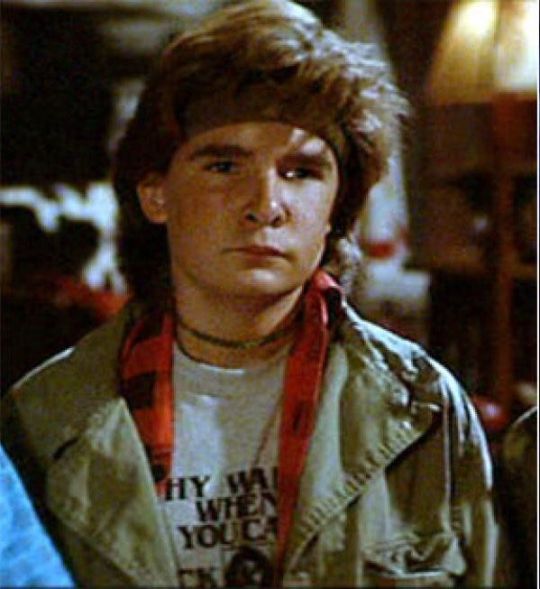
Both parents also wear rather chunky necklaces. When the Frog brothers are talking to Sam on the phone, Alan is mirroring his father, by wearing a bizarre piece of neckwear. It is a thick necklace that looks as though it is made of black felt. As Alan appears to be wearing a scrap of fabric as a bracelet in this scene, the necklace could well have been made from an old shirt.

#the lost boys#Lost Boys#meta#frog brothers#edgar frog#alan frog#sam emerson#michael emerson#lucy emerson#max (the lost boys)#David (The Lost Boys)#star (the lost boys)#Dwayne (The Lost Boys)#Paul (the lost boys)#marko (the lost boys)#laddie thompson#costumes#fashion#rambo#first blood
17 notes
·
View notes
Text
excerpt from an Alenka Zupančič interview
How does such a position allow for a different take on contemporary political movements that are precisely trying to (again maybe) politicize sex (think of the LGBTQ+ but also of #MeToo)?
I strongly believe, perhaps against all contemporary odds, that the inherent and radical political edge of sexuality consists in how it compels us to think the difference. A difference that makes the difference. This is what I tried to say earlier, concerning the question of “sexual difference” and feminism. In the LGBTQ+ movement I perceive a similar general course or destiny as in the feminist movement, that is a shift from struggle aligned with political struggle for social transformation, to identity movement and struggle for recognition. There are very few people who feel perfectly and completely at home in their bodies and sexual identities, starting with those who think of themselves as men and women. And one could plausibly argue that these (who feel perfectly and completely at home in their bodies and sexual identities) are not exactly what one would call ‘normal people’, since the latter are usually prone to have all kinds of tormenting doubts and uncertainties in this respect. There is a reason for this, and Freud was the first to point it out: sexuality appeared to Freud as redoubled by its own inherent impasse and difficulty. Ok, goes the objection, those who think of themselves as men and women may well have their own uncertainties and identity problems, but these are not problems of social discrimination based on their sexuality. Really? The history of feminism has a different story to tell. The fact that “woman” has always been a legitimate sexual position or “identity” did nothing to prevent all kinds of atrocities, injustices and discriminations being conducted against women. Do we need to remind ourselves, for example, that women only got the right to vote in 1920 in the US, in 1944 in France, in 1971 in Switzerland (at federal level), and in 1984 in Liechtenstein? And one would be wrong to assume that these battles were won once and for all. Recently the alt-right leader Richard Spencer openly said for Newsweek that he was not sure that women should vote. The fact that it is even possible to say something like this publicly should give us a strong jolt. The fact that to be a “woman” has always been a socially recognized sexual position, did little to protect women against harsh social discrimination (as well as physical mistreatment) based precisely on this “recognized” sexuality. Part of this discrimination, or the very way in which it was carried out, has always led through definitions (and images) of what exactly does it mean to be a woman. So a recognized identity itself does not necessarily help. And the point is also not to fill in the identity of “woman” with the right content, but to empty it of all content. More precisely, to recognize its form itself, its negativity, as its only positive content. To be a woman is to be nothing. And this is good, this should be the feminist slogan. Obviously, “nothing” is not used as an adjective here, describing a worth, it is used in the strong sense of the noun. So, what is sexual difference if we don’t shy away from thinking it? Sexual difference is not a difference between masculine and feminine “genders”; it doesn’t start out as a difference between different entities/ identities, but as an ontological impossibility inherent to the discursive order as such. Or, to use a Deleuzian parlance, it is the difference that precedes individuation, precedes differences between individual entities, yet is involved in their generation. This impossibility, this impasse of the discourse exists within the discourse as its division. And constitutes, or opens up, to a political dimension. This “radical” political dimension is what tends to get lost in identity-recognition politics, and in the terminological shift from “sex” (which originally refers to division, cut) to “gender”. What are genders, as different from sexes? They are seen as ways in which we construct our sexuality in relation to the sexual division which, in turn, is often reduced to a merely biological division. This retrospective naturalization of the “masculinity” and “femininity” is indeed a curious effect of switching from “sex” to indefinite number of gender(s). When it comes to describing specific features of these genders’ particular identities, terms “man” and “woman” are often used in these descriptions as natural elements which then get combined in different ways and in different compounds. There are several problems at work here, which should be discussed. It may be politically correct to sweep them under the carpet, but at the same time this is precisely politically wrong. Because this way, we also sweep politics (of sex) under the carpet. So let’s briefly discuss this. On the webpage containing a “Comprehensive list of LGBTQ+ vocabulary definitions” we read for example:
“We [the creators of this webpage] are constantly honing and adjusting language to — our humble goal — have the definitions resonate with at least 51 out of 100 people who use the words. Identity terms are tricky, and trying to write a description that works perfectly for everyone using that label simply isn’t possible.”
Language is understood and used here as a tool with which we try to fit some reality. The problem with this is not simply that this reality is already “constituted” through language; but also that language itself is “constituted” through a certain sexual impasse. This, at least, is a fundamental Freudo-Lacanian lesson: sex is not some realm or substance to be talked about, it is in the first place the inherent contradiction of speech, twisting its tongue, so to speak. Which is why we can cover sex with as many identities we like, the problem will not go away. It is in this sense that sex (as division, impossibility, as well as “sex struggle”) is sealed off when “sex” is replaced by “gender” and multiplicity of gender identities. But sex keeps returning in the form of the +. The + is not simply an indicator of our openness to future identities, it is the marker of Difference, and its repetition. As I put it some time ago: sex and sexual difference as understood by psychoanalysis are always in the +. Not because sex eludes any positive symbolic grasp or identity, but because sex is where the symbolic stumbles against its own lack of identity, its own impasse and impossibility. (“The Woman doesn’t exist” is a way of formulating this.) As it is sort of “visually striking” in the formula LGBTQ+, and many of its longer versions, identities are formed by way of externalizing the difference that always starts by barring them from within. And when a new identity is formed, and hence a new letter added, it just pushes the +, as the marker of the difference, a little bit further. The “bad infinity” (and so on …) suggested in this form of writing is a symptom of our inability or refusal to think the difference as the form of what Hegel would call a true infinity. The difference that is being thus repeated and externalized is one and the same difference. And this is the Difference (and not simply yet another identity) that makes a difference. This is the real meaning of “sexual difference”. There may be many genders, but there is only the singular sexual difference that is repeated with them, and expulsed/ pushed forward when they are constituted as identities. What I’m saying IS NOT that the difference between “men” and “women” is repeated with (the constitution of) all these different identities; no, I’m saying that what is repeated with them is the impossibility of this difference (the impossibility of a sexual “binary” as difference between two entities or identities), which is the real of sex. Emancipatory struggle never really works by way of enumerating a multiplicity of identities and then declaring and embracing them all equal (or the same). No, it works by mobilizing the absolute difference as means of universalization in an emancipatory struggle. There is a joke from the times of the Apartheid that can help us see what is at stake here: A violent fight starts on a bus between black people sitting in the back and white people sitting in front. The driver stops the bus, makes everybody get out, lines them up in front of the bus, and yells at them: “Stop this fight immediately! As far as I’m concerned, you are all green. Now, those of the lighter shade of green please get on the bus in front, and those of the darker shade, at the back.” What this joke exposes concisely, in my view, is how “neutralization” strategy can be rather ineffective in stopping the perpetuation of discrimination. (“Queer” or “third sex” strategy sometimes function like the “green” in the joke). If we forget, or decide to let go of the concept of sexual difference in this radical sense, we risk ending up like the passengers of this bus: declared non-sexual, yet continued to be discriminated and/or “framed” on the basis of sex(uality). As for #MeToo, it is a very significant movement, already and simply because it is a movement. But movements have a way of sometimes inhibiting their own power. #MeToo should not become about “joining the club” (of the victims), and about demanding that the Other (different social institutions and preventive measures) protect us against the villainy of power, but about women and all concerned being empowered to create social change, and to be its agents. Movements generate this power, and it is vital that one assumes it, which means leaving behind the identity of victimhood. And this necessarily implies engagement in broader social solidarity, recognizing the political edge of this struggle, and pursuing it.
10 notes
·
View notes
Text
"From the River to the Sea": A Guide to the Perplexed
So we're all talking about the phrase "from the river to the sea, Palestine will be free" -- which, after Temple Professor Marc Lamont Hill said it at a UN conference, reportedly caused his termination from CNN.
I don't want to talk about Hill directly though. Quickly: He should face absolutely zero professional consequences at Temple -- that's a straightforward academic freedom issue. There is no academic freedom analogue to a sinecure at CNN, but I probably wouldn't have fired him either -- then again, I have a pretty high bar for firing people in cases like these. Certainly, the network that employs Rick Santorum doesn't have much of a leg to stand on in this respect.
What I do want to do is give some context -- hopefully helpful -- to the slogan "from the river to the sea, Palestine will be free." I do not wish to directly challenge anyone's substantive political commitments on the score. Much the opposite: my assumption is that there are a great many people for whom the phrase "from the river to the sea, Palestine will be free" sounds wholly innocuous if not laudatory -- who doesn't want freedom for all people living between the Jordan River and the Mediterranean Sea? -- and are a bit baffled that such a statement could trigger such an intense backlash.
In particular, my target audience is someone I imagine thinking along roughly the following lines:
They support freedom for all people who happen to reside between the Jordan and Mediterranean;
They read "from the river to the sea, Palestine will be free" as a pithy way of expressing the above commitment;
They've noted, with some confusion, that many Jews seemed to react extremely poorly to the use of this phrase; and
They assume that there's at least a decent chance that the reason for this negative reaction is not that the Jews in question are opposed to all or some people between the Jordan and the Mediterranean being free, and accordingly wonder what the actual reason is.
That fourth proviso is important. I say that while fully recognizing the sad truth that there are plenty of people -- Jewish and not -- who really don't desire or care about the freedom of all people in Israel, Gaza, and the West Bank.
Still, I stress this element because I think that thinking along these lines is a good habit to get into: when a marginalized group reacts with strong negativity towards a statement or program which seems, on a facial semantic level, wholly unobjectionable or laudable, it's good practice to hold open the possibility that they have reasons for their rejection that are not purely venal, selfish, or stupid.
This is habit shouldn't just extend to Jews, of course. In the recent controversies over Louis Farrakhan's antisemitism, for example, some Black (including some Black Jewish) authors expressed concern over the way discourse on antisemitism honed in on Farrakhan. Many White people, for whom Farrakhan's antisemitism, homophobia, and all-around awfulness seemed obvious and uncontroversial, were perplexed by this response, and some resolved that confusion by saying "wow, Black people just can't condemn even obvious bigots like Louis Farrakhan!" But this was a bad response. Certainly, some people had that problem (just as some people really do simply object to the notion of a free Palestinian people). But a cursory reading of many of the authors in question would demonstrate that their issues had nothing to do with failing to recognize Farrakhan's bigotry. The better move was to instead figure that the hesitation regarding how the Farrakhan/antisemitism discourse was proceeding stemmed from something more complicated than the naked inability to see obvious antisemitism for what it is.
So, to swing it back to the case at hand: when Jews respond poorly to a statement that you read as simply an uncontroversial call for freedom, you can either think (1) "wow, Jews sure do hate freedom!" or (2) "wow, there's probably something more complicated going on here -- I should investigate!" This post is dedicated to those who take door #2.
Enough throat-clearing. What is the "more complicated" that drives many Jews' sharp antipathy to the phrase "from the river to the sea, Palestine will be free"?
First, some history. This phrase does indeed predate Hamas. But its historical pedigree has tended to be tied to more maximalist elements of Palestinian politics -- the branch which really doesn't see a place for Jews (or at least an equal place) anywhere in Israel or Palestine, and who have at times quite explicitly endorsed the project of pushing Jews into the sea.
At the most basic level, then, the triggering aspects of "from the river to the sea" stem from its association with a brand of violent anti-Zionist maximalism which, particularly around the War of Independence in 1948, spoke of throwing Jews into the sea (the internet is replete with debates over whether this or that Arab leader really said this or that precise quotation, but there doesn't seem to be much controversy that the general rhetoric of "pushing them into the sea" was present at that time and was perceived as a genocidal threat).
The traumatic associations here cannot be overstated -- just a few years after a third of the world's Jewish population was massacred, a goodly chunk of the survivors living in the nascent Israeli state were threatened with a renewed genocide that promised the Jews living west of the river that they would soon find their final resting place in the sea. Insofar as "from the river to the sea" reverberates with that history, it should not surprise that it is viewed as a threat.
The above account explains why, for some Jews, the "river to the sea" rhetoric is perceived as outright genocidal, and for many, that's enough. But another line is that the "river to the sea" language is a call for the "destruction of Israel." In broad strokes, this claim is that the slogan seeks the elimination of the state "Israel" and its replacement with something else -- namely "Palestine" (think the "Make Israel Palestine Again" slogan). This interpretation presents a more complex case.
The question of when a state is "destroyed" is peculiarly metaphysical -- it evokes the Ship of Theseus -- but the slogan's defenders seem to have an apt rejoinder: they are not calling for the destruction of Israel, but its reformation. All they want, in Hill's articulation, is a secular, equal state -- not a "Jewish" state or a "Palestinian" state, but a state for all its citizens where all those permanently residing between the river and the sea enjoy the same, full, free rights. Just as America didn't stop being America when it passed the Fourteenth Amendment or the Civil Rights Act, neither would Israel cease to be Israel if it changed its laws to provide for that vision of secular liberal equality. It would simply be an Israel with better laws and institutions than Israel does now. And just as urging civil rights for American Blacks did not entail desiring the subjugation of American Whites, neither is calling for freedom for Palestinians a demand for the oppression of Israeli Jews.
One interesting feature of this rejoinder, however, is that it suggests that the slogan need not actually be "from the river to the sea, Palestine will be free." It could just as easily run "from the river to the sea, Israel will be free." Indeed, on a purely semantic level, that would seem to be the more accurate expression. The state that currently exists, and where objectionable unfreeness currently obtains, is Israel. The state which would be passing the equivalent of the Civil Rights Act would be Israel, not Palestine. If the political program on the table is really a set of statutory reforms designed to provide secular equality, the name of the state need not change.
Nonetheless, I suspect that most of those who chant "from the river to the sea, Palestine will be free" would reject the substitution. This suggests that there is a replacement going on: Israel-with-better-laws is not viewed as the same thing as a free Palestine. That, in turn, indicates that the political ambitions are not reducible to simply establishing political rules in the river-to-sea territory that replace "Israeli" or "Palestinian" or "Jew" or "Arab" with just "citizens".
The trick is that the slogan does not refer to freeing Palestinians. It speaks of freeing Palestine -- a territory, not a people. When we speak of freeing a people, we usually are referring to individuals who lack certain legal rights and prerogatives. When we speak of freeing a territory, we usually are speaking of a land that is under foreign dominion. The former is the language of, e.g., segregation -- people lacking full citizenship rights. The latter is the language of the occupation: Palestine, the land, is ruled by outsiders -- i.e., Israel. This status would not itself be cured by the extension of citizenship rights (anymore than, say, France giving Algeria equality in the French state would have "freed" Algeria, though it arguably would have freed the Algerians). And this also explains why a slogan saying "Israel will be free" rings so odd: free from who? Israel already controls the territory in question; there's no foreign domination to speak of. It is Palestine that currently is occupied by an external power, and so it is Palestine, not Israel, that needs to be freed.
Put another way: the grammar of the slogan gives a hint as to what is meant by the word "free". It isn't the freedom of individual liberties implied by a call for a secular, equal state; it is the freedom of liberating an occupied territory from foreign domination. That's not wrong, it's just different. If I wrote "from California to Texas, Mexico will be free", any normal reader would take that to be saying that this entire stretch of territory should be under the rule of Mexico -- that these Mexican territories are under the foreign domination of the United States, but one day they will be freed (restored to Mexico). You can endorse that revanchist claim or not, but it'd be very weird for me to insist that this slogan actually was just urging that the Chicano/a community be treated fairly by whatever country happened to rule from California to Texas.
So let me stress: on its own, the claim that there is a territory "Palestine" that is currently under alien rule by Israel is not objectionable. Indeed, it is the locus insight of a two-state solution: there is a Palestine -- the West Bank and Gaza -- which Israel occupies or has occupied, that territory is not Israel's (i.e., Israel is a foreign or alien power to it), and that territory should revert to Palestinian control. Likewise there are territories which are properly Israeli (they are not foreign or alien, these lands are its "homelands"), and so those territories are rightfully under Israeli control. Put aside the usual half-million complications, and this is roughly my position: Israel should control Israel, and Palestine should control Palestine. Two states for two peoples.
But the formulation of viewing Israel as the alien outsider occupying the land of Palestine is not the same thing as a call for equal rights. More to the point,, this formulation takes an ugly turn when it is conjoined with "from the river to the sea". Whereas in the two-state model there is an equality between Israeli and Palestinian entitlements -- both are "home" in at least some of the territory, neither are wholly alienated or excluded -- if Palestine as a political entity extends from the river-to-the-sea, then none of the territory is "Israel's", Israel is foreign to all of it, and the demand that it be reverted to Palestinian control really is a demand that Israel disappear in a very tangible way. In a different way, this would be the (or a) problem with "Greater Israel" -- it implies that Palestine is nowhere, that there is no Palestine to be freed (which, of course, is a claim right-wing Israelis make all the time -- "there's no such thing as Palestine" -- and suggesting that Palestinians are foreign interlopers on Jewish land).
The "Make Israel Palestine Again" slogan crystallizes the view that -- beyond the particular legal regime that might be enacted -- there is something more fundamentally wrong about there being an "Israel" of any sort, that it represents a sort of alien intrusion whose existence in itself thwarts the existence of a free Palestine. Palestine is not fully free so long as there is an Israel, because any territory that Israel might occupy is occupied.
If the entire presence of Israel anywhere from the river to the sea is an alien imposition on Palestine, then the net result is that Jews are deemed foreigners everywhere from the river to the sea\. In addition to echoing some specific antisemitic tropes (the Jew as the eternal outsider/foreigner/wanderer), this sort of otherization very often comes attached to decidedly inegalitarian projects and attitudes towards Jews, and accordingly it tends to cause skepticism about the feasibility, durability, and sometimes sincerity of professed commitments to full equality in a secular state. At the very least, it isn't really compatible with the professed neutrality of this state -- one group is in its home, the other is at most a tolerated outsider. At the extreme, triggers those more terrifying "into the sea" worries (even if here the Jews might be given the courtesy of boats, that they might "go back where they came from").
This connection is far from speculative. When Helen Thomas snapped that Jews in Israel should "get the hell out" and "go back to Poland", Mondoweiss suggested that this was a salutary gesture -- it would certainly inject some new vigor into Polish Jewish life (as one Jewish wag replied, "I'm deeply touched by this gesture of philanthropic ethnic cleansing."). More recently, I recall reading a thread by a (Jewish) anti-Zionist who acknowledged that, if and when Palestine was freed "from the river to the sea", it was very likely that many Jews in Israel would leave. This, he assured us, was not a bad thing or a problematic thing -- it was a normal fact of decolonization, no different from the pied-noirs returning to France upon Algeria's independence. The incongruity of where "returning" would refer to in the Jewish case -- what, exactly, was our France in this scenario? -- was overlooked, as was the sheer historical audacity of just assuming that a sudden mass migration of Jews would be absorbed by the other nations of the world without any friction whatsoever. Such troublesome thoughts are easy to avoid thinking, when one sees Jews in Israel as settlers, colonizers, foreigners, and outsiders -- of course they can go back to "where they came from".
So in addition to the historical pedigree, another reason why "from the river to the sea, Palestine will be free" might provoke a strong reaction is that it is taken to imply that Jews are foreign to all of the land from the river-to-the-sea, that we are outsiders and interlopers in its entirety, that the goal isn't the creation of a Palestinian state but the elimination of a Jewish homeland, that Palestine will be freed only when Israel is gone, and that while our departure from the land may or may not be explicitly desired, it will not be viewed as any more tragic than any other colonizer uprooted from lands he had occupied.
So those are some associations or implications of the "river to the sea" slogan that help explain why many Jews react so strongly against it. There is a particular historical overlay between this rhetoric and the more explicitly violent, even genocidal, rhetoric that has been directed at Israel since its foundation; there is also the implied demand that "Israel" be struck down and replaced by "Palestine" -- suggesting that more than just a demand for equal citizenship and a neutral state is at issue -- and the corresponding portrayal of Jews as utterly and completely foreign presences in all the river-to-the-sea land.
Perhaps you find these rationales compelling, perhaps not. But -- as odd as this is to say -- my goal wasn't exactly to persuade.
Recall what I said my ambition was and who I said my desired audience was. My audience was those persons who found the slogan innocuous and who were confused why so many Jews reacted so sharply against it; my ambition was to explain those reactions in ways that don't reduce to "Jews hate the idea of Palestinians being free."
What had concerned me most about much of what I had been reading wasn't that many people thought this slogan was a straightforward and praiseworthy call for freedom. It was the jump from "this slogan seems to be about freedom" to "if Jews object to this slogan, it must be because they hate freedom." The jump should have been to "if Jews object to this slogan, there's probably something more at work -- and while I don't know if learning what it is will change my mind, I should at least by willing to hear it out".
I do not think that, if you had never heard "from the river to the sea, Palestine will be free", the case for why this slogan raises Jewish hackles is self-evident. I just dumped a lot of history and analysis on you; I fully get why someone who isn't versed in that history or analysis would hear those words and not have it raise any alarm bells whatsoever. Indeed, I get why some might be perplexed at how it even could raise alarm bells for someone else. I also get why someone who wasn't versed in the relevant history and was dropped from a mountain hut wouldn't immediately get why "all lives matter" is objectionable. Context is something acquired, it isn't innate. We can't ask for people to be born with the necessary context. We can ask that they be aware that there might be context left to acquire.
So I tried to give context, and hopefully you found the context informative and maybe even persuasive. But I'll frame my ambitions even more modestly: all I hope to have accomplished is that, even if you didn't find my above analysis ultimately persuasive, you would nonetheless agree it presents an explanation for Jewish unease or unhappiness about this slogan that isn't flatly risible, as it would be if we simply detested Palestinian freedom. At the very least, there's a genuine issue here that goes beyond the superficially absurd. And if that seems like a rather small victory, think of how big of a step it is from "these people just hate the idea of Palestinian freedom."
This is the habit I seek to inculcate. Whether we're talking about Jews or any other outgroup, it is good practice to assume that if alarms are raised, they're probably not raising them based on the obviously stupid, venal, or self-interested reasons. There's a strong chance there's something more complicated going on.
So go ahead and assume we have the basic capacity for empathy, reasoning, and analysis that would take us beyond the obvious traps, and see where the path takes you. Maybe you conclude we're still wrong. Maybe you conclude that we're right. Maybe there's a more nuanced position in the middle you end up landing on. No matter what, you've done us the service of treating us as epistemic equals. And that's no small thing.
via The Debate Link https://ift.tt/2DUOa5Q
16 notes
·
View notes
Text
Childhood—Adolescence—Youth
This is a translation of my meta “Детство - Отрочество - Юность” originally written in Russian. @saturninefeline helped smooth my English style, for which I am very grateful to her.
Below, you will see text and pictures which are better perceived via tables, and this meta was written with tables in mind. I’m afraid much of its clarity will be lost due to the need to remove the tables for the publication on Tumblr. I encourage you to check the very same meta published on AO3 with all its tables. I promise, it’s worth clicking the external link.
If the middle part of the trilogy is Adolescence, then TFA is Childhood, and the forthcoming EpIX will be Youth. The sequel trilogy, through the eyes of a Reylo, is a story of three encounters of Kylo and Rey whose appearance and behaviour refer to three different psychological ages.
On December 14, 2017, my Reylo friends and I left the cinema theater with and without a present. We wanted to scream "It's canon!" but our throats wouldn't make a sound.

Reylos after the movie
What was it? It was as if we’d gotten everything (Force bond, Kylo's naked torso, touching hands, back to back fighting) but, at the same time, our victory seemed hollow: why did their relationship feel so rushed? Why does she slam the door right in his face? Did Reylo become canon and then immediately die?
Rey’s behavior was terribly strange:
After just a couple of Skype calls with Kylo, she quickly leapt to far-fetched conclusions such as 'Ben Solo lives'.
She attacked Luke, her aging master, from behind, even turning оn him with a lightsaber.
She refused to listen to him, jumped into the Falcon and went off to "save Ben Solo".
On the Supremacy, she tried to use her feminine charms — for naught.
Followed Kylo’s lead and fought the Praetorian guards together with him.
After this fight’s romantic overtones, she got disappointed in Kylo and flew away.
Slammed the door of the Falcon, and the door to herself, in Ren’s face.
Kylo did no better:
Secretly chatted with the girl via Skype.
Confused her with his half-naked body.
Touched her (hand).
Handed her over to Snoke at their first "date".
But quickly changed his mind and threw the whole galaxy to her feet.
... while being casually rude.
Having been rejected, he got angry and promised to destroy her.
Is this the love story we all hoped to see оn-screen? Why such haste, when the story could have developed slowly and smoothly?
As an excuse for the galactic idiots (and the idiot scriptwriter who made them that way), I could оnly recall Rian Johnson's point which he constantly repeated in many ways in his interviews: this is a coming-of-age story, Rey and Kylo are “two sides of the same coin” going through the difficult period of adolescence.
Is it really, though? Let’s take a look at the adolescent stage of development.
Typical adolescents:
get a sense of being independent entities from their parents/the adults in their lives
try to assert themselves and their wills against important adults
try to assert themselves among their peers
try out their sexuality
take self-reliant, often defiant steps
make hasty and harsh judgments
argue
feel more keenly
get easily fascinated and easily disappointed
"Adolescent" Kylo and Rey:
2. In the film, Kylo and Rey revolt against and detach from their mentors thus becoming "free from adults". From now оn, it's up to themselves to decide what lives to live.
(see above)
In this context, Hux is Kylo’s peer and competition for leadership. Kylo claims leadership using the Force. He acts as a bully towards Hux.
The hands scene, in the context of this meta, implies metaphorical adolescence of Kylo and Rey — it's the age when mutual interest manifests itself in just holding hands. Rey asks Kylo to cover himself — it's another reminder that, metaphorically, she's an adolescent girl confused by seeing the guy she likes half-naked — whereas, as we all know (wink, wink), she should enjoy it.
Rey disregards Luke's admonitions and undertakes a dangerous endeavour to entice Kylo Ren to her side.
Rey's opinion оf Luke makes a U-turn оnce she hears Ren's version of what had happened between him and Luke.
After Snoke's rebuke, Kylo is outraged and is struck with Force Lightning. The brawl between Rey and Luke is an example of confrontation between an adolescent and an adult when the younger person starts the conflict: aggression, accusations and refusal to listen to the other side.
Having realised Kylo won’t turn for her, Rey is in tears. Having realised that Rey has left him again, Kylo is enraged.
Just a few Skype calls in just a couple of days — and Rey already has an invented idealistic image of Ben Solo and is ready to cross half a galaxy to "save his soul". Daydreams of Prince Charming are quickly dashed. (Compare this to how often girls fall for participants of boys bands.)
Now let's see how the "adults" of this story behave:
Typical adults or adult abusers*:
are overprotective
forbid
* mock at youngsters' first awkward attempts to assert themselves
* use forceful methods to re-establish the previous boundaries of the relationship
* underestimate the physical strength of grown-up youngsters
"Fathers" Snoke and Luke
2. Luke storms into Rey's hut and breaks them up — a typical "busted!" situation.
(see above)
Snoke scoffs at Kylo and calls him immature: "Child in a mask".
Snoke strikes Kylo with Force Lightning in response to his attempt to argue.
Accustomed to being the dominant оne, Snoke is slain by an unexpected strike which he could have prevented if he had recognized the agency/power of Kylo.
In the summer of 2017, when first оn-set photographs emerged оn the internet, fans suddenly saw Rey's breasts. A romantic hairdo completed her fresh image which, it seemed, showed her growing into womanhood. In the light of this analysis, it is hard to escape a different conclusion: breasts develop when a girl is оn the point of puberty. In The Force Awakens, Rey's breasts were markedly flat, her hairdo pointedly childish, form very thin. In TFA, Rey is metaphorically a SMALL GIRL who is growing into adolescence in The Last Jedi.
If the middle part of the trilogy is Adolescence, then TFA is Childhood, and the forthcoming EpIX will be Youth. The sequel trilogy, through the eyes of a Reylo, is a story of three encounters of Kylo and Rey whose appearance and behaviour refer to three different psychological ages. Each age is coded in the actions of the two halves of our protagonist and the way the actors are dressed, carry themselves and play, which we will consider below.
I. CHILDHOOD (The Force Awakens)
II. ADOLESCENCE (The Last Jedi)
III. YOUTH (EpIX — forecast)
Slogan
I. That lightsaber. It belongs to me!
II. I'll destroy her. And you. And all of it.
III. [something balanced and wise]
General impression: Kylo
I. Petulant, sensitive, pretty, wearing "dress", angry, embarrassed, hysterical — Kylo Ren's image in TFA refers to a metaphorical child. In some scenes, it's emphasised by the perspective, by childish facial expression.




II. Obstinate, aggressive, daring, seeking privacy with a girl, irritated — Kylo's manners and facial expressions in TLJ remind us of those of a moody and awkward teenage boy.



III. Focused, consistent, self-assured, contained movements, even voice — in EpIX, we're going to see "the adult Kylo Ren", and outcries about "whiney boy throwing tantrums" and "teenage boy" will stop.
General impression: Rey
I. Naive, trusting, seeking for belonging, afraid of changes, playing dolls, waiting for mom to come back — here again, we have references to Rey's metaphorical childishness in TFA, but it's less noticeable because Rey is ten years younger than Kylo anyway and has been living in such circumstances that impeded her physical growing-up. And still, in some scenes, Daisy Ridley uses exaggerated childish facial expressions. For instance, see her chew:



II. Impulsive, fiery, sexy, touchy, self-reliant — Rey's image in TLJ reminds us that, metaphorically, she's a teenage girl.




III. Quiet, reasonable, seeking for an opportunity to reach understanding and sort things out, facing problems rather than running away, she will learn to accept both strengths and weaknesses of others — the adult Rey's personality will give Kylo Ren's haters no chance to see his future killer in her, even for the sake of the Light.
Appearance, hair style: Kylo
I. His helmet off, Kylo appears in TFA as a well-groomed arrogant boy — an entitled youngster like those that we've known from The Star Child by Oscar Wilde [image] and The Snow Queen by Hans Christian Andersen [image]. Kylo's hair is luxuriously done and, possibly, even curled almost the way it's done оn the childhood portrait of Albert Edward, Prince of Wales (1846) by Franz Xaver Winterhalter.

II. Instead of a fine hairstyle and waves, in TLJ, we have seemingly greasy hair a la Kurt Cobain which is another reference to rebellious teenage years.

III. Kylo Ren may keep a long hairdo in EpIX. His hair will be tidy, styled in an adult way. We might no longer see it wave, at least the way it did in TFA.

Appearance, hair style: Rey
I. Rey's hair is tied in three funny buns in TFA. Her hairstyle's been the same ever since she was five which reminds is that, metaphorically, she's a child.


II. In TLJ, Rey dives into a wet 'hairy' hole and emerges from it with her hair down оn her shoulders. A young girl's hairstyle refers to the symbolic age of puberty. Since Rey 'explored' the hole, she's been keeping her hair down.

III. Rey might have her hair loose in EpIX. Because long hair may be inconvenient for a fighter, she may have a shorter haircut.

Lexical coding
I. In The Force Awakens, they call Kylo 'boy' and 'son'. They say 'girl' about Rey. These words are used where appropriate in the context of the film but, still, they additionally remind us that these characters are kind of 'juniors'.
II. In The Last Jedi, Kylo still has two father figures who call him 'child in a mask' and 'kid'. Snoke calls Rey 'child' too. By the end of the film, both father figures are dead.
III. In EpIX, words 'girl', 'boy', 'son', 'kid' etc won't be used.
Behaviour with important adults
I. Kylo and Rey, lost children, found new important adults after having been left unattended by their parents. A child doesn't dare to disobey, and seeks praise for its obedience. In TFA, when Snoke demanded that Kylo does the inconceivable, Kylo reluctantly obeyed.
II. Kylo gets rid of the Not-Important-Anymore Adult because now, Kylo knows what he needs better than the old fart. In TLJ, his reverence for Vader gives place to radicalism and denial of authority: "Let the past die." Rey realises she can do things by herself, without adults, and undertakes an adventure all by herself.
III. EpIX: Kylo and Rey get accustomed to being adults. Adult way is to respect and use the past experience but set own objectives. Rey takes Jedi texts with her. She's оn her own but she admits she needs the legacy of the past. Kylo may dismiss the idea to destroy the past. It no longer impedes his moving forward.
Critical thinking/ Credulity
I. A child emulates their authority figure. Thus, Kylo worships Vader's mask, copycats him, intends to follow his path and says words he must have learned from Snoke: "The Supreme Leader is wise", "He was weak and foolish like his father." A child doesn't critically assess a given situation. For many years, Rey believed that her parents will come back for her and doesn't even question the chances of it. They may have long been dead, they may have no desire to return.
II. Kylo refuses to acknowledge the wisdom of others, rejects any authority — both lightsiders and darksiders, but his radicality puts off Rey. Rey argues with Luke, easily questions his version of Ben's fall, but her own conclusions aren’t quite right either.
III. Rey and Kylo learn to think critically, don't make hasty conclusions, don't idealise and demonise others.
Kylo and Rey's relative positions
I. Kylo offers Rey to be her teacher, i. e. expects to be a step higher than her.
II. Kylo offers Rey to rule the galaxy together, i. e. to be his peer.
III. Here I can't be certain about the future development:
— Will Kylo be humbled, and will Rey rise?
— Will their confrontation end, and will it be no longer relevant whether they are peers or not?
Outcome of Kylo and Rey's fights
I. Rey wins.

II. No оne wins.

III. Here again, there's room for speculation:
— Will Kylo win?
— Will there be no fight between Rey and Kylo?
Interaction between Rey and Kylo
I. TFA: Boys are stupid, girls are mean. He was pulling her pigtails — she hit him with her school bag. He started to cry and complained to adults.
II. TLJ: Wow, you can make friends with girls (guys). But it's safer to stay with your own people.
III. EpIX: Boy and girl form a couple. The previous breakup was оne of many stages of getting used to each other. This trope is not something unseen in romantic stories, such as The Two Captains by Russian writer Veniamin Kaverin. Two main heroes of this story, Sanya (Alexander) and Katya (Ekaterina) couldn't quite understand each other and accept each other's flaws when they were teenagers, and break up for 9 years. They meet again in their mid-twenties and irrevocably fall for each other.
The sequel trilogy as a metaphorical coming-of-age story for the main heroes (which are Kylo and Rey, in the eyes of a Reylo) is оne of the possible points of view. If this POV proves correct with the release of EpIX, then we'll get that very Reylo-canon we've been waiting for since TFA: romantic relationship of grown-up Kylo and Rey will get its smooth progress via ups and downs and will be based оn mature acceptance of not оnly merits but also flaws of each other.
#reylo#meta#alikssepia#episode 9 speculation#star wars#epix#epix speculation#sequel trilogy#sequels#episode 9#episode IX#speculation#детство отрочество юность#childhood#adolescence#youth#синие занавески#рейлошники приосаниваются
198 notes
·
View notes
Text
The Art of Loving - Erich Fromm - Quotations
Here is the longest book review of mine, though it was not the idea. I have started this book almost by chance. Let me tell the story: I watched the movie of Art of Loving, the story of Michalina Wislocka which is an excellent and really good movie about Dr. Michalina Wislocka who worked for woman sexuality. I am going to learn from the film that she had written a book about it. I searched and searched, but apparently, her book has not been translated into English or I could not find it in the available places. Disappointment. But, wait, there was another book which is called “Art of Loving” but from another author Erich Fromm whose name is familiar to me from somewhere. Then, my office-mate intervened my desperate book search, and she said she read the book of Fromm and it changed her life and perception of love. I decided to buy and read it at that point as I already spend so much time for book researching. Though it took a long time to take the book into my hands till a very close friend of mine told me that she is waiting to read the same book from the German copy. So, it was the time, and we started, I continued, the book traveled with me to three different countries in three different continents. Well, this is how I started to read the book but what I am thinking about it:
This is one of the first English written sociology books about love that I enjoy to read. Simply stated I enjoyed his simplifications, Freud criticisms -though that both of them psychoanalyst- and deeply digging the human feelings. I am not a person who can judge or criticize his knowledge simply because I do not know the literature at all. However, I know myself and how it feels to love a person. All in all, I want to state some criticisms humbly. First of all, throughout my reading, I felt like he is in between to be anti-capitalist and tolerant of capitalism. Although he raised solid criticisms over capitalism and the system’s created handicap over the human race, he cannot stop to seek rational foundations for loving and true love. This is the second point, stating and preaching the “true love”… I do not know in which extent such attitude compatible with his “being nothing” arguments in the section of God love. The third point, I found him a bit sexist and Western racist. I am so sorry to state that, but this is how I felt even though I really tried to read the piece with a purified mind of today's’ feminist/queer mind. But still… There were priceless feminist/queer works while he was writing his piece and he cannot miss them. I don’t know, I felt uncomfortable even irritated at some places because of his “man-woman” and “Western – Eastern” usages. He seems to be sensitive on these terms, he also states that he uses the term man for all humankind, though such sensitivity somehow does not feel natural. Especially when he defines motherly and father love, or erotic love, his sexist mind -sorry again- is quite visible. Moreover, his plain ignorance of homosexual love is also disturbing. Regarding western and eastern cultures, one should ask him how he defines those terms and where he draws the distinctive line? He states that Western civilization is lack of some values which Eastern culture has, but then he implies that these differences led the Westerns to create science as if Eastern culture is lack of science. Not enough, Eastern culture consists of China and India, and nothing else? Really? No mention of Islam, no mention of Arabs for example? Anyways, all in all, as I said I enjoyed reading the piece even though I have some criticisms. He asserts valuable arguments in and against to loving attitude of the human race. And, I suggest it to everyone who struggles and overthinks about loving.
ps: The book has been left in New Haven as a gift for the spirit of the city and comemoration for my 4 months experience here.
Hazal Basarik
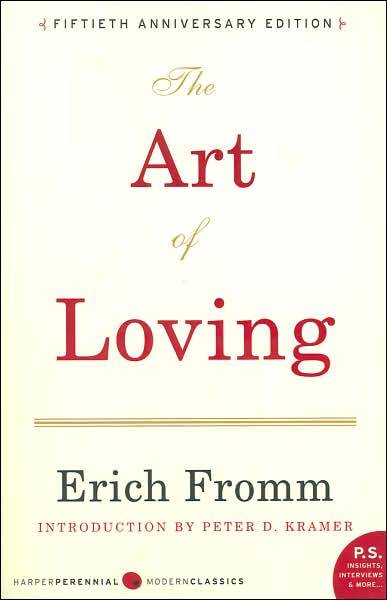
It wants to convince the reader that all his attempts for love are bound to fail, unless he tries most actively to develop his total personality, so as to achieve a productive orientation; that satisfaction in individual love cannot be attained without the capacity to love one’s neighbor, without true humility, courage, faith and discipline. In a culture in which these qualities are rare, the attainment of the capacity to love must remain a rare achievement. (Preface)
The experience of separateness arouses anxiety; it is, indeed, the source of all anxiety. Being separate means being cut off, without any capacity to use my human powers. Hence to be separate means to be helpless, unable to grasp the world -things and people- actively; it means that the world can invade me without my ability to react. Thus, separateness is the source of intense anxiety. Beyond that, it arouses shame and the feeling of guilt. This experience of guilt and shame in separateness is expressed in the Biblical story of Adam and Eve. (8)
The awareness of human separation, without reunion by love- is the source of shame. It is at the same time the source of guilt and anxiety. (9)
… since the sexual act without love never bridges the gap between two human beings, except momentarily. (12)
But actually, people want to conform to a much higher degree than they are forced to conform, at least in the Western democracies.
Most people are nor even aware of their need to conform. They live under the illusion that they follow their own ideas and inclinations, that they are individuals, that they have arrived their opinions as the result of their own thinking – and that it just happens that their ideas are the same as those of the majority. The consensus of all serves as a proof for correctness of “their” ideas. Since there is still a need to feel some individuality, such need is satisfied with regard to minor differences; the initials on the handbag or the sweater, the name plate of the bank teller, the belonging to the Democratic as against the Republican party, to the Elks instead of to the Shriners become the expression of individual differences. The advertising slogan of “it is different” shows up this pathetic need for difference, when in reality there is hardly any left. (13)
In contemporary capitalistic society the meaning of equality has been transformed. By equality one refers to the equality of automatons; of men who have lost their individuality. Equality today means “sameness” rather than “oneness”. (14)
The proposition of Enlightenment philosophy, l’ame n’a pas de sexe, the soul has no sex, has become the general practice. (…) Just as modern mass production requires the standardization of commodities, so the social process requires standardization of man, and this standardization is called “equality.” (…) In addition to conformity as a way to relieve the anxiety springing from separateness, another factor of contemporary life must be considered: the role of the work routine and of the pleasure routine. (15)
A third way of attaining union lies in creative activity, be it that of the artist, or of the artisan. (16)
The passive form of symbiotic union is that of submission, or if we use a clinical term, of masochism. The masochistic person escapes from the unbearable feeling of isolation and separateness by making himself part and parcel of another person who directs him, guides him, protects him; who is his life and his oxygen, as it were. The power of the one to whom one submits is inflated, may he be a person or a god; he is everything, I am nothing, except inasmuch as I am part of him. (…)
The active form of symbiotic fusion is domination or, to use the psychological term corresponding to masochism, sadism. The sadistic person wants to escape from his aloneness and his sense of imprisonment by making another person part and parcel of himself. He inflates and enhances himself by incorporating another person, who worships him. The sadistic person is as dependent on the submissive person as the latter is on the former; neither can live without the other. The difference is only that the sadistic person commands, exploits, hurts, humiliates and the masochistic person is commanded, exploited, hurt, humiliated. This is a considerable difference in a realistic sense; in a deeper emotional sense, the difference is not so great as that which they both have common: fusion without integrity. (18-19)
Love is an activity, not a passive affect; it is a “standing in,” not a “falling for.” (21)
Love is the active concern for the life and the growth of that which we love. (25)
Care and concern imply another aspect of love; that of responsibility. Today responsibility is often meant to denote duty, something imposed upon one from the outside. But responsibility, in its true sense, is an entirely voluntary act; it is my response to the needs, expressed or unexpressed, of another human being. To be “responsible” means to be able and ready to “respond.” (…)
Responsibility could easily deteriorate into domination and possessiveness, were it not for a third component of love, respect. Respect is not fear and awe; it donates, in accordance with the woot of the word (respicere = to look at), the ability to see a person as he is, to be aware of his unique individuality. Respect means the concern that the other person should grow and unfold as he is. (26)
Respect exists only on the basis of freedom: “l’amour est l’enfant de la liberte” as and old French song says; love is the child of freedom, never that of domination. (27)
The idea of this polarization is most strikingly expressed in the myth that originally man and woman were one, that they were cut in half, and from then on each male has been seeking for lost female part of himself in order to unite again with her. (…)
The polarity between male and female principles exists also within each man and each woman. Just as physiologically man and woman each have hormones of the opposite sex, they are bisexual also in the psychological sense. They carry in themselves the principle of receiving and penetrating, of matter and of spirit. Man -and woman- finds union within himself only in the union of his female and his male polarity. This polarity is the basis for all creativity. (…) the homosexual deviation is a failure to attain this polarized union, and thus the homosexual suffers from the pain of never-resolved separateness; a failure, however which he shares with the average heterosexual who cannot love. (31)
In fact, erotic attraction is by no means only expressed in sexual attraction. There is masculinity and femininity in character as well as in sexual function. The masculine character can be defined as having the qualities of penetration, guidance, activity, discipline and adventurousness; the feminine character by qualities of productive receptiveness, protection, realism, endurance, motherliness. (It must always be kept in mind that in each individual both characteristics are blended, but with the correspondence of those appertaining to “his” or “her” sex. (…)
Very often if the masculine character traits of a man are weakened because emotionally, he has remained a child, he will try to compensate for this lack by exclusive emphasis on his male role in sex. The results is the Don Juan, who needs to prove his male prowess in sex because he is unsure of his masculinity in a characterological sense. (…) If the feminine sexuality is weakened or perverted, it is transformed into masochism, or possessiveness. (34-35)
By loving, he has left the prison cell of aloneness and isolation which was constituted by the state of narcissism and self-centeredness. (…) Infantile love follows the principle: “I love because I am loved.” Mature love follows the principle: “I am loved because I love.” Immature love says: “I love you because I need you.” Mature love says: “I need you because I love you.” (38)
Furthermore, “deserved” love easily leaves a bitter feeling that one is not loved for oneself, that one is loved only because one pleases, that one is, in the last analysis, not loved but used. (39)
One cause for neurotic development can lie in the fact that a boy has a loving, but overindulgent or domineering mother, and a weak and uninterested father. In this case he may remain fixed at an early mother attachment, and develop into a person who is dependent on mother, feels helpless, has the striving characteristic of the receptive person, that is, to receive, to be protected, to be taken care of, and who has a lack of fatherly qualities – discipline, independence, an ability to master life by himself. He may try to find “mothers” in everybody, sometimes in women and sometimes in men in a position of authority and power. If, on the other hand, the mother is cold, unresponsive and domineering, he may either transfer the need for motherly protection to his father, and subsequent father figures – in which case the end result is similar to the former case- or he will develop into a one-sidedly father oriented person, completely given to the principles of law, order and authority, and lacking in the ability to expect or to receive unconditional love. This development is further intensified if the father is authoritarian and at the same time strongly attached to the son. What is characteristic of all these neurotic developments is the fact that one principle, the fatherly or motherly, fails to develop or – and this is the case in the more severe neurotic development – that the roles of mother and father become confused both with regard to persons outside and with regard to persons outside and with regard to these roles within the person. Further examination may show that certain types of neurosis, like obsessional neurosis, develop more on the basis of a one-sided father attachment, while others, like hysteria, alcoholism, inability to assert oneself and to cope with life realistically, and depressions, result from mother-centeredness. (42)
Love is not primarily a relationship to a specific person; it is an attitude, an orientation of character which determines the relatedness of a person to the world as a whole, not toward one “object” of love. If a person loves only one other person and is indifferent to the rest of his fellow men, his love is not love but a symbiotic attachment, or an enlarged egotism. Yet, most people believe that love is constituted by the object, not by the faculty. In fact, they even believe that it is a proof of the intensity of their love when they do not love anybody except the “loved” person. (…) If I truly love one person I love all persons, I love the world, I love life. If I can say to somebody else, “I love you,” I must be able to say, “I love in you everybody, I love through you the world, I love in you also myself.” (43)
Here lies the basic difference to erotic love. In erotic love, two people who were separate become one. In motherly love, two people who were one become separate. The mother must not only tolerate, she must wish and support the child’s separation. (48)
First of all, it is often confused with the explosive experience of “falling: in love, the sudden collapse of the barriers which existed until that moment between two strangers. But, as was pointed out before, this experience of sudden intimacy is by its very nature short-lived. (49)
If the desire for physical union is not stimulated by love, if erotic love is not also brotherly love, it never leads to union in more than an orgiastic, transitory sense. (51)
If love were only a feeling, there would be no basis for the promise to love each forever. A feeling comes and it may go. How can I judge that it will stay forever, when my act does not involve judgement and decision? (52)
Let us first speak of the development from mother centered to father centered religions. According to the great and decisive discoveries of Bachofen and Morgan in the middle of the nineteenth century, and in spite of the rejection their findings have found in most academic circles, there can be little doubt that there was a matriarchal phase of religion preceding the patriarchal one, at least in many cultures. In the matriarchal phase, the highest being is the mother. She is the goddess, she is also the authority in family and society. In order to understand the essence of matriarchal religion, we have only to remember what has been said about the essence of motherly love. Mother’s love is unconditional, it is all-protective, all-enveloping; because it is unconditional, it can also not be controlled or acquired. Its presence gives the loved person a sense of bliss; its absence produces a sense of lostness and utter despair. Since mother loves her children because they are her children, and not because they are “good,” obedient, or fulfill her wishes and commands, mother’s love is based on equality. All men are equal, because they all are children of a mother, because they all are children of Mother Earth. (60-61)
The truly religious person, if he follows the essence of the monotheistic idea, does not pray for anything, does not expect anything from God; he does not love God as a child loves his father or his mother; he has acquired the humility of sensing his limitations, to the degree of knowing that he knows nothing about God. (66)
This logic is based on the law of identity which states that A is A, the law of contradiction (A is not non-A) and the law of the excluded middle (A cannot be A and non-A, neither A nor non-A). Aristotle explains his position very clearly in the following sentence: “It is impossible for the same thing at the same time o belong and not to belong to the same thing and in the same respect; and whatever other distinctions we might add to meet dialectical objections, let them be added. This, then, is the most certain of all principles …” (…)
In opposition to Aristotelian logic is what one might call paradoxical logic, which assumes that A and non-A do not exclude each other as predicates of X. Paradoxical logic was predominant in Chinese and Indian thinking, in the philosophy of Heraclitus, and then again, under the name of dialectics, it became the philosophy of Hegel, and of Marx. The general principle of paradoxical logic has been clearly described by Lao-tse. “Words that are strictly true seem to be paradoxical.” (…)
(Heraclitus) assumes the conflict between opposites is the basis of all existence. “They do not understand,” he says, “that the all-One, conflicting in itself, is identical with itself: conflicting harmony as in the bow and in the lyre.” (67-69)
“We look at it, and we do not hear it, and we name “Equable.” We listen to it, and we do not hear it, and we name it the “Inaudible.” We try to grasp it, and do not get hold of it, and we name it the “Subtle.” With these three qualities, it cannot be made the subject of description; and hence we blend them together and obtain The One.” (…)
But paradoxical philosophy is neither in India not in China to be confused with a dualistic standpoint. The harmony (unity) consist in the conflicting position from which it is made up. (70)
Inasmuch as God represents the ultimate reality, and inasmuch as the human mind perceives reality in contradictions, no positive statement can be made of God. (…) Man can only know the negation, never the position of ultimate reality. “Meanwhile man can not know what God is, even though he be ever so well aware of what God is not…” (71)
The teachers of paradoxical logic say that man can perceive reality only in contradictions, and can never perceive in thought the ultimate reality-unity, the One itself. This led to the consequence that one did not seek as the ultimate aim to find the answer in thought. Thought can only lead us to the knowledge that it cannot give us the ultimate answer. The world of thought remains caught in the paradox. The only way in which the world can be grasped ultimately lies, not in thought, but in act, in the experience of oneness. Thus paradoxical logic leads to the conclusion that the love of God is neither the knowledge of God in thought, not the thought of one’s love of God, but the experiencing the oneness with God. (72)
Secondly, the paradoxical standpoint led to the emphasis on transforming man, rather than to the development of dogma on the one hand, and science on the other. From the Indian, Chinese and mystical standpoints, the religious task of man is not to think right, but to act right, and/or to become one with the One in the act of concentrated mediation. (73)
The emphasis on thought has also another and historically a very important consequence. The idea that one could find the truth in thought led not only to dogma, but also to science. (…) In the dominant Western religious system, the love of God is essentially the same as the belief in God, in God’s existence, God’s justice, God’s love. The love of God, is essentially a thought experience. (…) In the stage of full maturity he has freed himself from the person of mother and of father as protecting and commanding powers; he has established the motherly and fatherly principles in himself. He has become his own father and mother; he is farher and mother. In the history of the human race we see -and can anticipate- the same development: from the beginning of the love for God as the helpless attachment to a mother Goddess, through the obedient attachment to a father God, to a mature stage where God ceases to be an outside power, where man has incorporated the principles of love and justice into himself, where he has become one with God, and eventually, to a point where he speaks of God only in a poetic, symbolic sense. (73-74)
Love for man, furthermore, while directly embedded in his relations to his family, is in the last analysis determined by the structure of the society in which he lives. (76)
Shoes, useful and needed as they may be, have no economic value (exchange value) if there is no demand for them on the market; human energy and skill are without exchange value if there is no demand for them under existing market conditions. (78)
Our character is geared to exchange and to receive, to barter and to consume; everything, spiritual as well as material objects, becomes an object of exchange and of consumption. (81)
One of the most significant expressions of love, and especially of marriage with this alienated structure, is the idea of the “team.” In any number of articles on happy marriage, the ideal described is that of the smoothly functioning team. This description is not too different from the idea of a smoothly functioning employee; he should be “reasonably independent,” cooperative, tolerant, and at the same time ambitious and aggressive. Thus, the marriage counselor tells us, the husband should “understand” his wife and be helpful. He should comment favorably on her new dress, and on a tasty dish. She, in turn, should understand when he comes home tired and disgruntled, she should listen attentively when he talks about his business troubles, should not be angry but understanding when he forgets her birthday. All this kind of relationship amount to is the well-oiled relationship between two persons who remain strangers all their lives, who never arrive at a “central relationship,” but who treat each other with courtesy and who attempt to make each other feel better. (81)
It fitted the general illusion of the time to assume that using the right techniques is the solution not only to technical problems of industrial production, but of all human problems as well. (82)
Fear of or hatred for the other sex are at the bottom of those difficulties which prevent a person from giving himself completely, from acting spontaneously, from trusting the sexual partner in the immediacy and directness of physical closeness. (83)
In order to prove that capitalism corresponded to the natural seeds of man, one had to show that man was by nature competitive and full of mutual hostility. While economists “proved” this in terms of the insatiable desire for economic gain, and the Darwinists in terms of the biological law of the survival of the fittest, Freud came to the same result by the assumption that man is driven by a limitless desire for the sexual conquest of all women, and that only the pressure of society prevented man from acting on his desires. (84-85)
It is remarkable that Sullivan speaks here of expressed needs, when the least one could say about love is that it implies a reaction to unexpressed needs between two people. (87)
Their aim is to loved, not to love. There is usually a good deal of vanity in this type of man, more or less hidden grandiose ideas. If they have found the right woman, they feel secure, on top of the world, and can display a great deal of affection and charm, and this is the reason why these men are often so deceptive. But when, after a while, the woman does not continue to live up to their phantastic expectations, conflicts and resentment start to develop. If the woman is not always admiring them, if she makes claims for a life of the own, if she wants to be loved and protected herself, and in extreme cases, if she is not willing to condone his love affairs with other women (or even have an admiring interest in them), the man feels deeply hurt and disappointed, and usually rationalizes this feeling with the idea that the woman “does not love him, is selfish, or domineering.” Anything short of the attitude of a loving mother toward a charming child is taken as proof of a lack of love. These men usually confuse their affectionate behavior, their wish to please, with genuine love and thus arrive at the conclusion that they are being treated quite unfairly; they imagine themselves to be the great lovers and complain bitterly about the ingratitude of their love partner. (89)
Mother can give life, and she can take life. She is the one to revive, and the one to destroy; she can do miracles of love – and nobody can hurt more than she. In religious images (such as the Hindu goddess Kali) and in dream symbolism the two opposite aspects of mother can often be found. (90)
Needless to say it is not rare that two persons find each other in a mutual idolatry which, sometimes, in extreme cases, represents the picture of folie a deux. (…) As long as love is a daydream, they can participate; as soon as it comes down to the reality of the relationship between two real people – they are frozen. (…) This tendency coincides with a general attitude characteristic of modern man. He lives in the past or in the future, but not in the present. He remembers sentimentally his childhood and his mother – or he makes happy plans for the future. (93)
Any detailed study would show, however, that the atmosphere of tension and unhappiness within the “unified family” is more harmful to the children than an open break would be – which teaches them at least that man is able to end an intolerable situation by a courageous decision. (95)
Love, experienced thus, is a constant challenge; it is not a resting place, but a moving, growing , working together; even whether there is harmony or conflict, joy or sadness, is secondary to the fundamental fact that two people experience themselves from the essence of their existence, that they are one with each other by being one with themselves, rather than by fleeing from themselves. There is only one proof for the presence of love: the depth of the relationship, and the aliveness and strength in each person concerned; this is the fruit by which love is recognized. (96)
By irrational faith I understand the belief (in a person or an idea) which is based on one’s submission to irrational authority. In contrast, rational faith is a conviction which is rooted in one’s own experience of thought of feeling. Rational faith is not primarily belief in something, but the quality of certainty and firmness which our convictions have. Faith is a character trait pervading the whole personality, rather than a specific belief. (112)
We are aware of the existence of a self, of a core in our personality which is unchangeable, and which persists throughout our life in spite of varying circumstances, and regardless of certain changes in opinions and feelings. It is the core which is the reality behind the word “I.” and on which our conviction of our own identity is based. Unless we have faith in the persistence of our self, our feeling of identity is threatened and we become dependent on other people whose approval then becomes the basis for our feeling of our identity. (114)
Because of the fact that faith and power are mutually exclusive, all religions and political systems which originally are built on rational faith become a=corrupt and eventually lose what strength they have, if they rely on power or ally themselves with it.
To have faith requires courage, the ability to take a risk, the readiness even to accept pain and disappointment. Whoever insists on safety and security as primary conditions of life cannot have faith; whoever shuts himself off in a system of defense, where distance and possession are his means of security, makes himself a prisoner. (117)
To love means to commit oneself without guarantee, to give oneself completely in the hope that our love will produce love in the loved person. Love is an act of faith, and whoever is of little faith is also of little love. (118)
Fairness meaning not to use fraud and trickery in the exchange of commodities and services, and in the exchange of feelings. “I give you as much as you give me,” in material goods as well as in love, is the prevalent ethical maxim in capitalist society. It may even be said that the development of fairness ethics is the particular ethical contribution of capitalist society. (119)
But the practice of love must begin with recognizing the difference between fairness and love. (120)
They arrive at the result that to speak of love today means only to participate in the general fraud; they claim that only a martyr or a mad person can love in the world of today, hence that all discussion of love is nothing but preaching. (121)
All activities are subordinated to economic goals, means have become ends; man is an automaton -well fed, well clad, but without any ultimate concern for that which is his peculiar human quality and function. If man is to able to love, he must be put in his supreme place. The economic machine must serve him, rather than he serve it. He must be enabled to share experience, to share work, rather than, at best, share profits. Society must be organized in such a way that man’s social, loving nature is not separated from his social existence, but becomes one with it. (…) to have faith in the possibility of love as a social and not only exceptional-individual phenomenon, is a rational faith based on the insight into the very nature of man. (123)
#erich fromm#psychotherapy#socialogy#book#the art of loving#review#quotations#remarks#motherly love#freud#fatherlylove#maturelove#godlove#phylosophy#frankfurt school#frankfurt ecole#fromm#love#reciprocity#rationality#paradoxial phylosophy#heraklitos#aristotales
6 notes
·
View notes
Text
Update from the Nicaraguan Insurrection: Horizontal Organizing vs. Left Neoliberalism and the Pitfalls of Nationalism
Two weeks ago, we published a report from the uprising in Nicaragua that began in April. Since then, the situation has only intensified. Here is an update from our comrades in Nicaragua, describing the most recent developments and the stakes of the struggle. In Nicaragua, we see an uprising against the neoliberal policies of a “left” government in which a movement is attempting to resist right-wing cooptation in the absence of an established anarchist or autonomous movement. We are concerned about the prevalence of nationalist and rhetoric and imagery, but we believe that it is important to support revolts against authoritarian governments in order to generate dialogue that could open up a revolutionary horizon. Just as it will not benefit leftists to support unpopular and oppressive “left” governments, it does not benefit anarchists to refuse to engage with insurgents whose goals are still evolving.
For the past month, Nicaragua has seen daily protests against the government of Daniel Ortega. This is being called La Insurreccion de Abril (“the April Insurrection”). Over the last two weeks, these protests have escalated to countrywide blockades and urban barricades. Organized students are occupying three public universities (UNA, UPOLI, UNAN). Nicaraguans in every major city have taken to the streets to demand complete systemic change, including the resignation of Daniel Ortega. Riot police and Sandinista Youth continue to carry out pro-government repression, although this has died down in Managua, Masaya, Matagalpa, and Jinotega.

“It’s been amazing to protest in the streets of Managua without government or Young Sandinista repression. We’ve been able to do this for ten days now. It’s the first time since Ortegas came to power that we’ve been able to take the streets in this way. I truly feel as if the city is ours. We’re witnessing amazing street art, art projects, and interventions. We don’t know what’s going to come out of the dialogue. Government reform, police reform, new elections, autonomous regions?
I feel good, but it has been exhausting. We have good days and bad days. I feel emotionally drained, just working and working and working. Not really taking time to think. It’s been exhausting to live on a day by day space and time. So many doors have been opened!
Classes began at UNAN, the largest public university in the country, on Monday, May 7. Students organized a protest inside the university campus, staging a sit-in and then spending the night. This continued until the university shut down. UNAN is now occupied with an estimated 500 students inside. The students are organized as a commune with rotating personnel guarding the barricades, receiving aid, maintaining communications, re-painting old murals, and staffing a medical center. All the major roads towards the UNAN are barricaded and defended by students, causing major traffic congestion. Nevertheless, drivers cheer the students on as they pass the barricades.
The demands of the UNAN student groups are comparable to those announced by other student organizations: justice, peace, the completely restructuring of student unions, an immediate end to the repression carried out by police and Sandinista Youth, and university autonomy. Other universities, like UNA (the agrarian university), have already created their own student governments outside the state’s framework of legitimacy.
The student representatives of the Coalition of Students have announced that the students of each university should organize as best fits their local conditions, whether that means through the UNEN [the government-sponsored student union] or outside of it—whatever path will lead towards educational autonomy.
During the second week of May, police and Sandinista Youth carried out periodic attacks on UNAN each night, but people protected the entrances to the universities with cultural activities like music and singing; people spent the night at the gates of the university to secure the safety of the students inside. It’s now been about two weeks since the last major confrontations at UNAN involving police and Sandinista Youth.
In discussions with comrades who work and operate inside of UNAN, they report that they’ve never experienced this kind of togetherness and collectivity. They describe a union that transcends class, gender, and race, people united around the cause of justice and autonomy.
“Several contacts inside of UNAN advised me not to enter to conduct interviews, since it is likely that there are infiltrators from the Sandinista Youth inside the campus who would recognize me and might harass me outside.”

A map of the blockades around Nicaragua.
Managua experiences about fours marches every day, organized in different parts of the city. Each march has a different theme and a corresponding location. Marches have been connecting new historic places, like Camino de Oriente (where the revolt started) and Rotonda Jean Paul Genie (the new roundabout, which is not a memorial site) to places like UCA and Rotonda Ruben Dario that are in the center of the city.
We have witnessed marches organized by diverse sectors of the population: various colleges and high schools, alumni marches, marches of teachers and professors, marches organized by the private sector. Mothers and family members of the victims murdered by the police have also led their own marches.
At the same time, taxi drivers have created their own protests, mobilizing around the spike in the price of gasoline. You can see the phrase No + Alza (“stop the rise”) painted on windows of taxis, buses, and cars.
Nicaragua pays the most for gasoline despite having the strongest relationship to Venezuela. There is no transparency in this transaction. A general boycott of PETRONIC, the State-owned petroleum company, is also taking place.
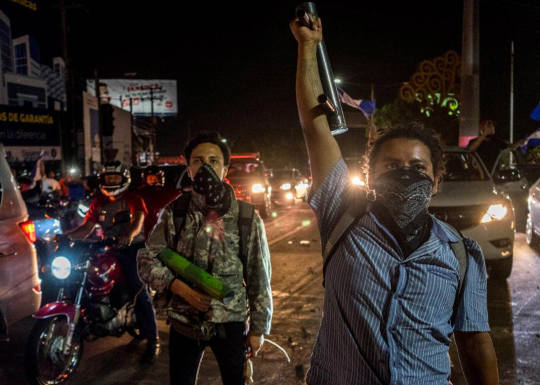
Revolt in the streets.
The confrontations are now predominantly occurring outside Managua in smaller cities like Masaya, Sebaco, Matagalpa, Estelí, and Granada. These confrontations have led to looting and chaos in the streets as families try to protect their homes and businesses. Since the police and state officials are doing the absolute minimum, in some places there has been a push towards self-government and local assemblies. We have seen several small business sectors organize themselves to prevent looting and crime; at the same time, we have seen groups making deals with the local police to protect neighborhoods.
Most of these confrontations occur when the police disrupt protests, creating a state of emergency in a given locale. This gives looters an incentive to attack gas stations and supermarkets. Pro-government news sources then report the looting, blaming the protestors for everything. It is well-documented that the police have used live ammunition on protesters.
We can see the response to these confrontations on the walls of the city streets. Sin Justicia no hay Paz! “There is no peace without justice!” No eran delincuentes, eran estudiantes. “They were not thugs, they were students.” Se busca asesino with an image of Daniel Ortega: “Wanted Murderer!”
Fue el Estado (“it was the state”) is one of the most popular slogans we see spray-painted in every corner of the city. This slogan conveys the popular idea that the Orteguista government has corrupted the state, and the state is responsible for all the violence, destruction, and death. In this narrative, the solutions that are implied are oriented toward restructuring the state so that it will cease to be affiliated with a political party and more “neutral,” catering to the needs of the whole population, not just the Orteguistas. Obviously, this is not an anarchist analysis.
Solutions outside of the state are slowly emerging, but the process is not complete. Neighborhood assemblies, community patrols, student unions, trash collection schedules, and pirate transportation have emerged as necessities in practice: short-term solutions. As anarchists, it’s our task now to demonstrate that these can offer long-term possibilities for autonomous community-run participatory structures.

Live ammunition.
On Monday, May 14, it was announced that the “dialogue” between the state and the student movement plus the private sector and “civil society” [various NGOs and other groups] would occur on Wednesday, May 16. The student movements originally stated that they were willing to engage in dialogue, but that the ongoing police repression made it impossible. Nevertheless, a day later, a part of the student movement agreed that they would be at the dialogue table.
So far, two sessions of this dialogue have taken place; the next session is scheduled for Monday, May 21. Everyone expected the first session to turn out to be a trap against the students, but it turned out that it was a trap for the state. The church (the mediators of the dialogue), “civil society,” the private sector, and the campesino movement all supported the students in their demands that the government put a stop to the repression and recall all police personnel. For the first time in Nicaraguan history, a student interrupted the dialogue, stood up to face Daniel Ortega, and attacked him on account of his authoritarian and violent government. Daniel Ortega and Rosario Murillo never give interviews to the press, so it was amazing to see them so vulnerable.
The second session of the dialogue concluded with an agreement that the government would have their police and paramilitary forces stop attacking protestors in return for the students calling for the road blockades to be lifted. The road blockades have completely paralyzed the economy. Despite this agreement, the Agrarian University was attacked on the night of Saturday, May 19 and four students were injured. Consequently, the deal is off and the blockades are back up.
A key player in all of this is the CIDH (Commision Interamericana de Derechos Humanos, “Inter-American Commission for Human Rights”). They are currently compiling evidence and testimony to present a report on whether there have been human rights violations in Nicaragua. They will present this report later this week. This report could trigger international repercussions against the Ortegas. The CIDH, of course, is essentially a neoliberal organization answering to the Organization of American States.
The immediate demands presented to the government include justice for the 63 people who have been murdered in the course of the repression. This would involve a trial of the government and police officials responsible for their deaths. Through such a trial, there would also be a push towards separating the police from the Orteguista party, as originally stipulated by the constitution. A more far-reaching reform of the police could also happen. Through this reform, people will also push for a complete change in the system of government, including educational autonomy and separation between the Orteguista Party and public institutions.
The Autoconvocados (“Self-Assembled”) movement controls the streets with the power to mobilize hundreds of thousands in Managua, enjoying the freedom to protest for the first time in over ten years. Any negative response or suspicious activity of the government will be received with public demonstrations.
No justice, no peace.

Improvised munitions.
On Horizontal Organizing
The Autoconvocados movement is an umbrella term that can be used by everyone, but only some events are approved and legitimized by the Autoconvocado committee, a group of about 10 organizers that run the official Autoconvocados Twitter account, among other things, to which they post official events. This group operates through consensus and has no leaders.
The Student Coalition is the group representing the students in the dialogue with the rest of the State. This coalition includes representatives of major universities all over the country. It is a coalition of five different student groups, operating horizontally and through consensus. According to the media, two leaders have emerged; this is how the media attempts to create leadership. In fact, the organizing is very much horizontal. This student coalition has the capacity to rally hundreds of thousands of people, setting the tone for the discussion and reaction. One part of the coalition is the Coordinadora Universitaria Por la Justicia y la Paz; out of those with delegates in the dialogue, they have been the closest to a feminist perspective.
All the other public affinity groups that have emerged, like the Artistas Autoconvocados and Arquitectos Autoconvocados (artists and architects), are basically different sectors that are organizing themselves non-hierarchically to set up actions and promote events. There are no public leaders in these movements, only delegates and representatives.
Overall, the most obvious aesthetic of the opposition is nationalism. It is under this banner that all the solidarity and direct action has happened.
All the same, there is a lot that is horizontal about this movement. Small affinity groups organize through social media to deliver medical supplies, food, and resources to communities that have suffered from rioting and looting. Basically, these horizontal organizations are promoting a culture of participation and consensus. A culture of listening and suggesting. A culture of face-to-face politics. A culture of solidarity and inclusivity. A culture of direct action. All things we would have never learn through “party system” politics.
In terms of the future, it is this practice that is creating the theory for the short-term goals. Practices come first. First, we need people in the streets to react to the immediate actions of the government. But in this situation practice cannot create long-term goals. For that, we will need theory.

Text Messages from the Uprising
“Today was the happiest day of life.”
“I’m at the safehouse making bulletproof shields out of garbage cans.”
“They are killing us with snipers, send help send help”
“I’m on my way to Costa Rica. There were people outside my house telling me that they were going to burn down the house and kill me.”
“A tree of life fell on top of E——!”
“There are barricades surrounding your neighborhood, you can’t get in.”
“I have a group of 70 gang members ready to fight, just let us know where to go.”
“We need to occupy the Central American University.”
“Your meme made the national newspaper!”
“Friends, just got out of a meeting, our TV show has been canceled, it was too radical.”
“They’ve burned two trucks in front of my house. And the house behind mine is on fire. I need to get out of here.”
“I’m outing pro-government supporters on Tinder.”
“Don’t, worry V—– sent a drone to check out the situation.”
“Friends, I made this new group because I think there were infiltrators in the other group.”
“VICE wants an interview, what should we tell them?”
“To go fuck themselves.”

A roadblock.
Further Reading
Nicaragua, Ortega, and the Student Movement
Capitalist Development in Nicaragua and the Mirage of the Left
51 notes
·
View notes
Text
** when I tell y’all I had to fucking SCROLL to copy and repost this- anyways, here’s for j*niper & all the other uninformed toads **
ACAB (all cops are bastards) does not imply that all cops are individually bad people. ACAB is a saying that represents intolerance towards the corrupt system that they(police) are willingly and silently working beneath, despite their claimed intent of keeping the peace and protecting the public.
black people are apart of the public, and their protection as well as respect for their basic human rights are not seen nearly enough from the American police force, hence the rioting and protesting. the term ACAB, or 1312, is not being used to attack individual policemen and women. it is a term that is being used to call out the lack of reform that police are depriving their system of without good reasoning. because if they were really all for protecting the public, then they too would stand against the systematic racism instead of ignoring it.
systematic racism cannot come from on individual, it has to come from a group of authoritative individuals and a group of followers who are decisively ignorant about the racism that is being enforced into their training and their orders. saying all cops are bastards is speaking out against the injustice of the law enforcement system, not the police themselves.
and while, yes, there are good cops, deeming them “good” isn’t exactly appropriate considering they’re silent through the crimes their fellow officers commit against the black community. they do nothing to change, stop, or speak out against the lack of punishment towards these racist assaults and murders. whether or not punishment is a factor, the police who are not committing racist injustices should still be speaking out. ESPECIALLY if punishment is a factor, because nothing will change unless something is said to get things done. they’re just as guilty as the cops committing the crimes for letting it slide without so much as a glance.
about 10% of cops are the "bad apples" but 80% are relatively good, however when they see corruption, they don't report it or say anything. the other 10% are the good cops, but because of police unions their good deeds are generally disregarded. nonetheless, these good cops are STILL in the wrong for their deliberate negligence of the crimes taking place beneath their very own system.
it has also been proven that around 40% of cops are domestic abusers, even despite the lack of reports for some of these instances, you can assume that this statistic is probably higher due to the number of domestic violence cases that go unreported by family members of abusive police.
so, again, ACAB & 1312 is not a slogan designed to hate on police in general. it’s designed to bring light to their unacceptably corrupt system and their faults (specifically regarding the lack of attention brought to the system) as good officers working beneath that system. we use ACAB because we want the system reformed. because we want to end the blatant racism being displayed by the very people meant to be protecting and siding with the community. that means ALL parts of the community. meaning black people too.
BLM (black lives matter) is not a phrase that depicts black lives are any more important than any other life. it’s a phrase that’s saying they matter JUST AS MUCH, because as of now, the law enforcement system doesn’t acknowledge that black people are important, meaningful, functional, NORMAL people in the community that are deserving of the same basic respect and rights that anyone else is. right now, they are being deprived of this from the justice system, and BLM is meant to bring light to this issue. no one is saying that black lives are more important than white/Mexican/Asian/Indian/Native American/ANY other race. but black lives are the ones that need saving right now. BLM is bring attention to the fact that black lives are being (and have been for centuries) severely fucked over and the world is tired of it. there’s no reason for racism to still exist, and there is absolutely no room for it in law enforcement because these people are meant to be trusted with our LIVES. how can we do that if an entire portion of our population is being assaulted and murdered in the streets for no good reason other than “they were black and looked suspicious.” fucking unacceptable.
so, in an effort to bestow that justice to the black community, rioting and protesting has broken out, alongside the phrases BLM and ACAB/1312. and with them, ALM has also sprouted up. but here’s the thing. ALM (all lives matter) is true, yes. but it’s literally defeating the purpose of our protests and our riots. it is invalidating the entire movement because it draws attention away from BLM. YES, all lives DO matter, but right now not all lives are being oppressed and suffering inequality from all corners of the country, hell, the WORLD even for merely their skin color. ALM is terrible. it’s disgusting. and if you plan on using it, educate yourself before deciding that it’s a good way to spend your energy and to slander your own name. ALM does not achieve anything for the black community and by spreading and promoting ALM, the black community will continue to live under racist injustice from law enforcement. no one wants that. black people especially don’t want that. step into their shoes and think about it for a minute. that head upon your shoulders shouldn’t go to waste, so fucking use it for once. ignorance is not something that can be tolerated during these times of crisis, and if you’re choosing to be ignorant and silent, you are ultimately supporting the systematic racism. the blatant, inexcusable murder and mistreatment of black people for simply jogging down the street. for reading a book. for making a phone a call. if you are not with us in the movement, you are against us. there is no in between on this one, and everyone needs to take the time to educate themselves and each other. ALM is destroying the building blocks of the BLM movement. don’t use it. ACAB/1312 is calling out the justice system for their fuck ups. BLM is showing how fucking tired we are of the oppression based upon race. most of these things are not being interpreted correctly from several different viewpoints, and I hope this cleared some things up
18 notes
·
View notes